#kuro analysis
Explore tagged Tumblr posts
Text
So I don't see many people talk about this when talking about Sebastian's character development, or even when talking about Sebaciel.
But Sebastian went from throwing his master into a den of venomous snakes for 'the thrill of the game'


To freaking out because of a needle prick.

In the span of 8-9 months.
The Circus arc happened in February 1889 and the Music Sphere Hall events happened around Halloween.
Soooo... What the hell happened to that insolent bastard of a demon?
Well, the first change is Agni. Agni's words of putting their masters' health, happiness, and well-being really got to Sebastian and he has followed his advice. For butler aesthetics, of course. After all, he's one hell of a butler. And while he appeared to have disregarded Soma's words about being kinder to Ciel, he did show more sympathy/concern after that.
What started as a butler aesthetics became a habit and soon enough, it became ingrained in him. He started carrying around a physician book, he showed some concerns over Ciel's health in Campania and the Easter special.



Don't tell me that he wasn't fooled by Ciel's act, because he was. He looked just as surprised as Soma & Agni.
And then... GWA happened.
I won't rehash it all over again about what I think of what happened in GWA, how important it is for the development of Sebaciel's relationship. But it's here that Sebastian realized that he could've lost Ciel and there was absolutely nothing that he could do about it.
The game has changed.
It's no longer about the thrill of the game anymore. Now it's about taking care of his charge, about putting his health and well-being first. He's no longer interested in being a 'beast'. What he wants now is to be Ciel's boyfriend butler.
146 notes
·
View notes
Text
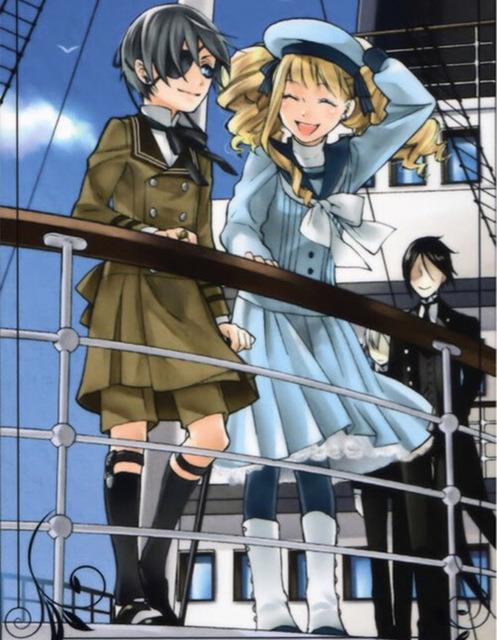
In Depth Analysis: Sebastian and Elizabeth
I love the relationship that Lizzy and Sebastian have. If you know the fact that Sebastian is the Main Character of Black Butler (it’s in the title) and subscribe to the romance/intimacy that he and Ciel share, then this would make Lizzy one of the Biggest Antagonists of all of Black Butler. On the level of antagonism to the Undertaker, perhaps even more! Which is funny because, just, just LOOK AT HER. She’s just this preteen girl!! Who the heck would consider her an antagonist?!

These two have gone up against literal immortal forces that pose a great threat to them physically. The only person who holds this kind of sway is the real Ciel. However. I would consider him to be more of an antagonist to both Ciel and Sebastian, whereas Lizzy is an antagonist and a threat to Sebastian alone. And while Ciel’s Brother (R!ciel) reminds Ciel of his past, Lizzy reminds Ciel of his Future that he will never have. Although she is a bit of a nuisance and a hindrance to Ciel and his plans, Lizzy isn’t a full fledged antagonist for him.
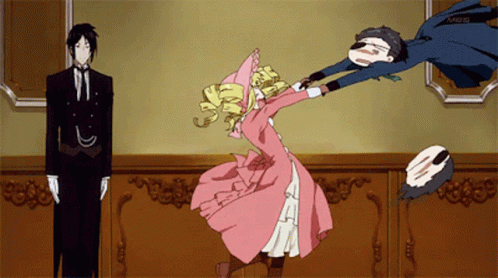
She’s even a sweetheart to everyone, even Sebastian, despite how weird the entire Phantomhive estate is. Their cordial passive aggressiveness and pleasantness between them compared to more direct characters (such as Aunt Francis) is fascinating to watch.
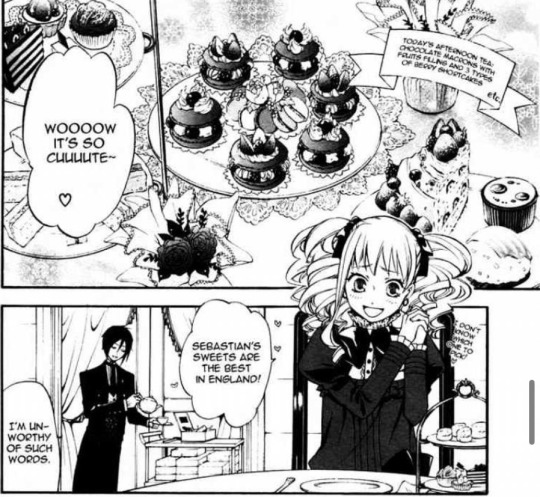
But she has him absolutely TREMBLING in his leather boots, because not only is she the Main Antagonist, but no, a Love Antagonist Even. Because even though our Ciel still keeps her at an arms length and treats her more like family than a proper fiancé, he still cares tremendously about her and her emotions. She represents a life where our Ciel Lives, grows up, has a future, and doesn’t pursue his Revenge. Which is the biggest threat to their contract entirely. As a narrative foil, she’s sweet, loud and angelic, and based on the original story, could be the very salvation that could Save Ciel’s soul.
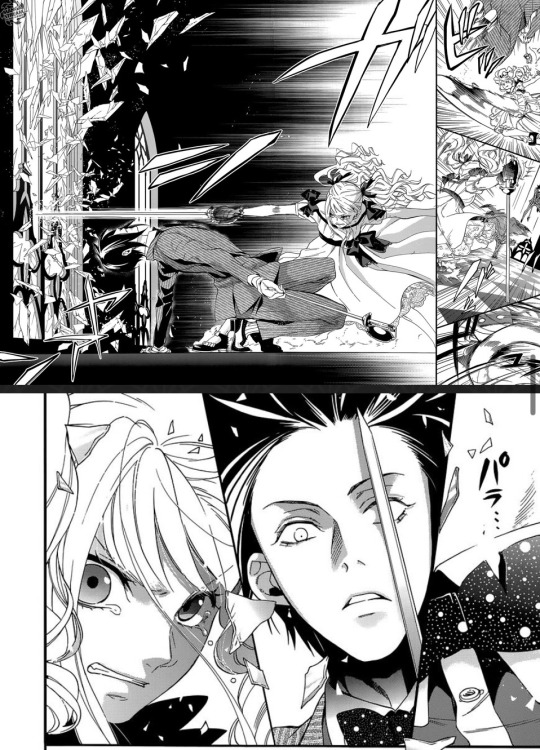
And the best part of it is she is also really, really good at fighting and can go toe to toe with Sebastian in a fight- and he Can’t even lay a finger on her!
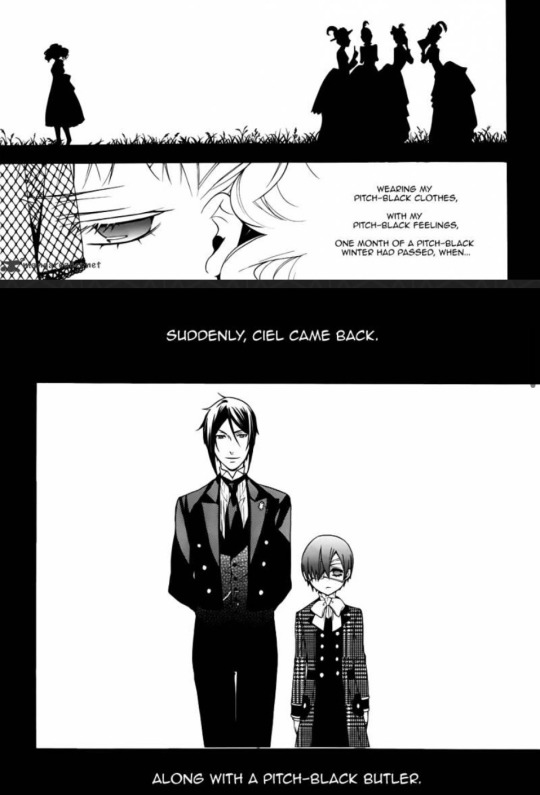
The envy these two have for each other is palpable- each wants what the other has of Ciel’s Time and Affections. It’s the difference between wanting a Public Relationship for Appearances and desiring a private relationship for sharing one’s secrets.
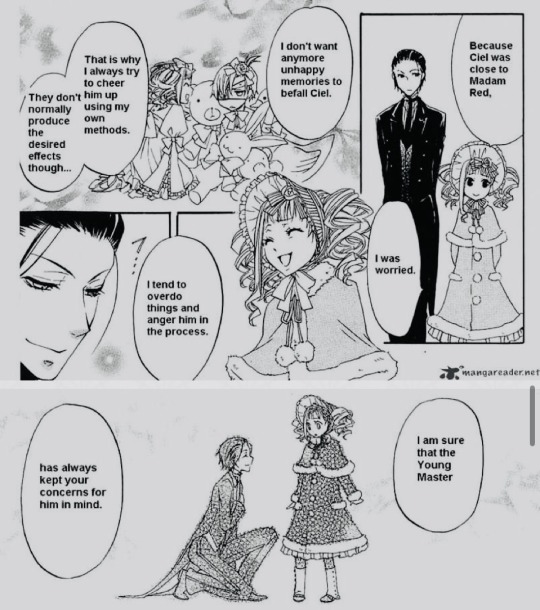
I think the most interesting aspect of their relationship is that even though they’re rivals, Sebastian Lets Lizzy GO, going completely against Ciel’s Wishes, knowing that was “impossible to shackle one’s heart”. Was this some small mercy of growth or sympathy, distance the two from interacting, or simply a way to move the agenda forward?
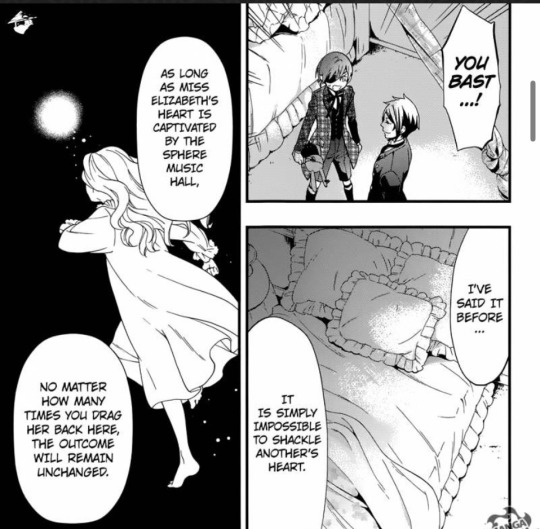
The only character that would consider her an antagonist of any type would be a demon.
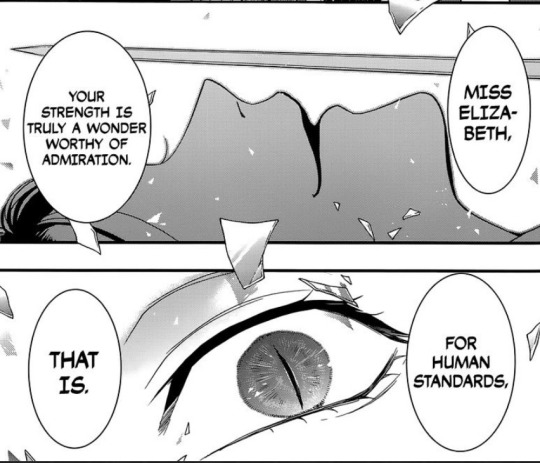
#kuro analysis#elizabeth midford#black butler analysis#kuroshitsuji#sebaciel#< for containment purposes#also drew some art about it (infected by the blorbos)
147 notes
·
View notes
Text
the fact that kobolds seem to be this more "animalistic" race, with kuro talking in broken language and like improper grammar. this, coupled with the fact that he seems unaware of the fact that he's being exploited by mick, makes kobolds appear to be less intelligent than other races.
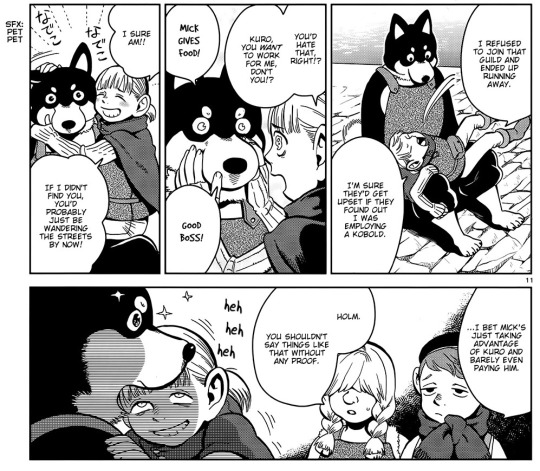
but we actually find out that the simple speech patterns are in fact due to common being kuro's second language. and in a scene where kabru talks to kuro in his native language, it's actually kabru with the simple speech patterns.

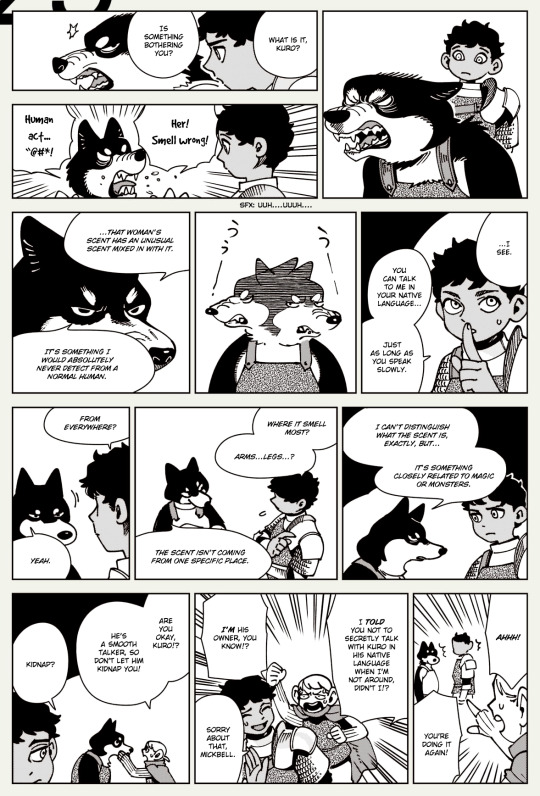
we even learn that kuro seems to actually have a much better understanding of his situation with mick than we first imagine. merely wanting to stay with them so they can have someone who they can feel relaxed around.
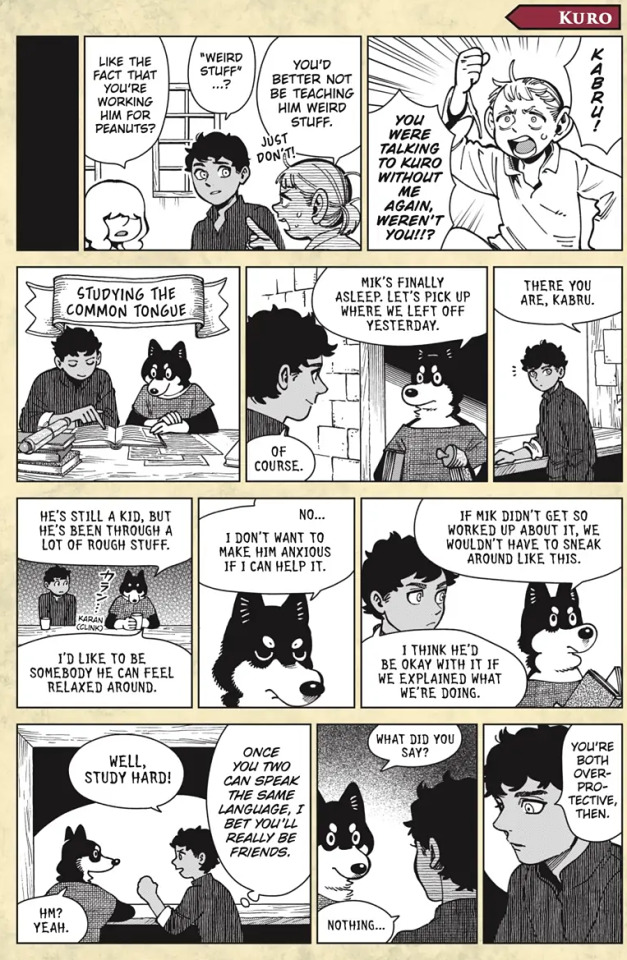
this, coupled with a bunch of other things, really makes dungeon meshi stand out from other fantasy media. there are no "dumb" or "evil" races, they're all just people.
29K notes
·
View notes
Text


This is from the Hanakotoba, the Japanese Language of the flowers that Kana Toboso uses. It’s cannon!
the victorian erotic symbolism will never fail because this is beautifully symbolic and amazingly horny.

lilies representing virginity and purity about to be cut. a red rose typically symbolises love but this one is wilting — that means death. Sebastian is both the one who will kill Ciel the same as he’s the one who will deflower him.
254 notes
·
View notes
Text
Kabru, impossible mutual understanding & unknowable objects
Despite his concerted and constant efforts to understand other people, it’s established in a few extras that Kabru believes that true mutual understanding between certain different races is impossible. Specifically, between long-lived and short-lived races, and between humans and demi-humans. Partially, we can trace this conviction back to specific hang-ups caused by his life; the trauma of the Utaya disaster, prejudices he carries from his childhood, and his experience of racism among the elves. In this “little” essay, I’m gonna discuss how I think those experiences formed this belief, how it comes out in his actions, and how some of his actions seem to contradict it. The question of whether it’s possible to reach mutual understanding with other living beings despite our differences is one of the core themes of the manga, and I’ll also touch on how this aspect of Kabru’s character links to that.
Seeking understanding
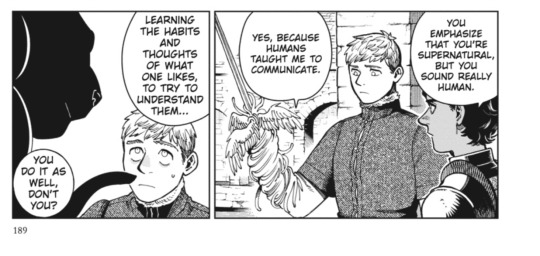
Kabru is a character who devotes a huge amount of time and effort to understanding people, and he is very good at it. In his internal monologue, we can tell how advanced and complex his skills of analysis are. He is able to read a huge amount of information just from looking at people's faces and body language.


People are, to him, what monsters are to Laios. This is something that's been expanded on at length in other, excellent meta. It's the fact that they're foils; it's the fact that Kabru is also very easy to read as autistic, with a special interest which is the opposite and parallel of Laios'. It's something that came out of trauma and alienation, as Laios' special interest in monsters also began as a coping mechanism.
The complicated origin of this "love" for monsters and for people comes through, I think, in the fact that one of the places we see both characters use their fixation is in being very, very good at killing the thing that they love. This also ties into the idea that loving something isn't even remotely mutually exclusive with using it to sustain your own survival; using it for your own purposes; hurting it or killing it. Love can be, and often is, violent, possessive and consumptive. This understanding is part of what makes Kui's depiction of interpersonal relationships so compelling to me.
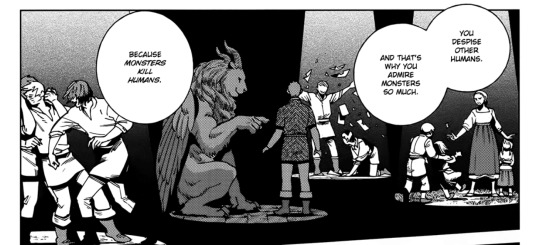
While Laios fixated on monsters and animals to seek a place of escape, in both his imagination and his self-image, from the humans who he couldn't understand and who couldn't understand him, Kabru seems to have fixated on understanding people in order to navigate the complex, socially marginal places that he has been forced into throughout his life. As an illegitimate child raised by a single mother with an appearance that marked him out as different to the point his father's family wanted to kill him, and a tallman child raised among elves who didn't treat him as fully human and wanted him to perform gratefulness for that treatment – treatment that, after he met Rin at age 9, he certainly always understood could be a lot worse – his ability to work out what people wanted from him, whether they were friendly or hostile or had ulterior motives, wasn’t just an interest. It will have been an essential skill.
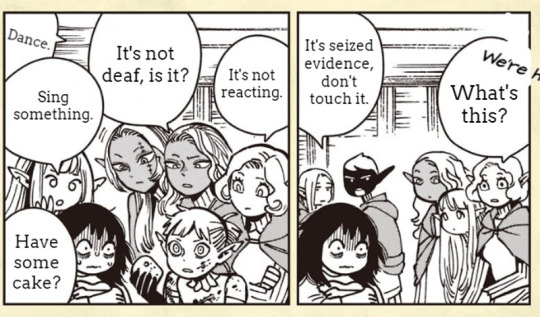
Milsiril, I think, was a flawed parent who tried to do her best by Kabru and did a lot of harm to him despite her best intentions. She may have treated him much better than an average elf would have, but like Otta and Marcille's mother, there are other elves with different outlooks on short-lived races. How would they judge her treatment of him? We don’t have any insight on what it could be, but to be honest, the person’s whose opinion of her I’d be most interested in knowing is Rin’s.
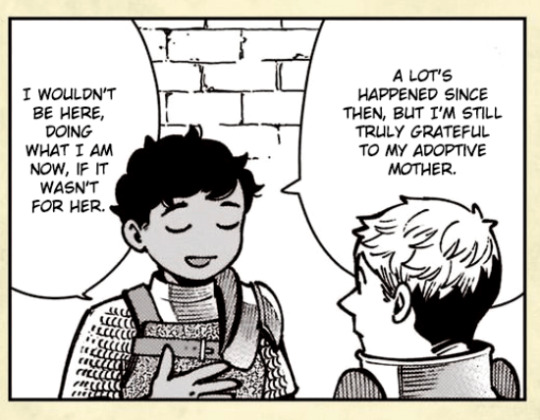
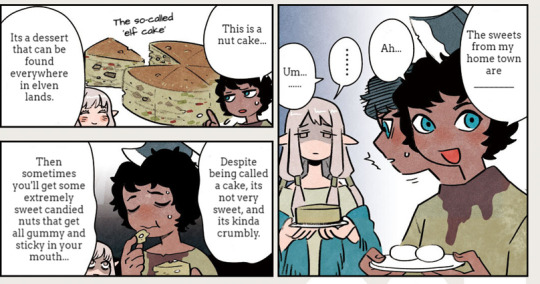
But even if she'd been perfect, living as an trans-racial adoptee in a deeply hierarchical nation with a queen who is a 'staunch traditionalist' who wouldn't even acknowledge the existence of a half-elf like Marcille (according to Cithis) is an experience that would deeply impact anyone.
Elves & Impossible mutual understanding
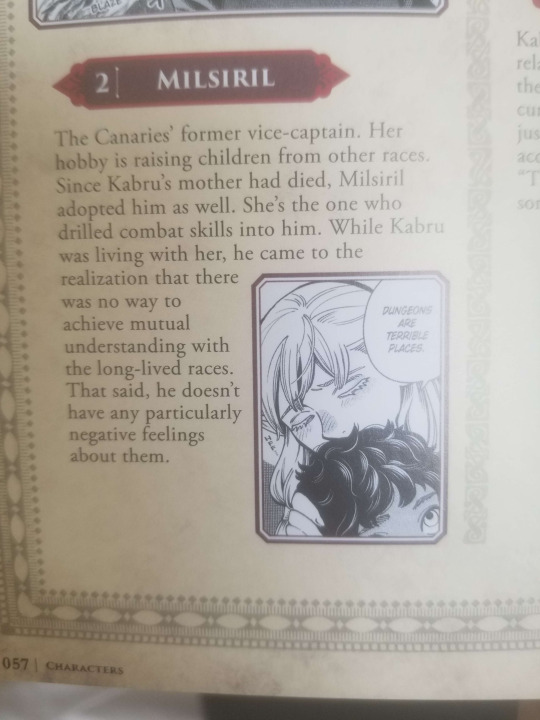
While Kabru was living with Milsiril - in other words, while living in the Northern Central Continent - he came to believe that "there was no way to achieve mutual understanding with the long-lived races."
This is evident in his political project: he wants short-lived races to have ownership over the dungeon's secrets. Despite his dislike of the Lord of the Island, he's a useful bulwark to stop the elves taking over. Despite his doubts about Laios, Laios needs to be the one to defeat the dungeon, because if he doesn't the elves will take over.
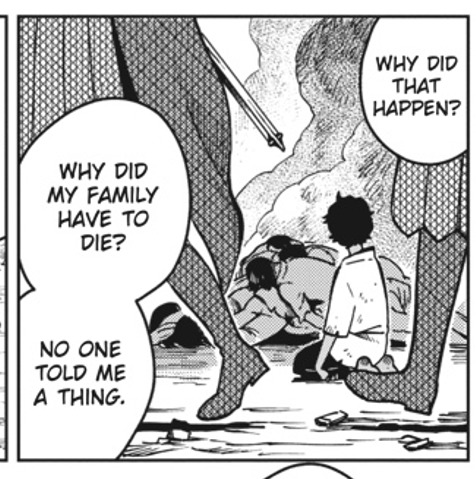
Kabru still carries a deep scar from Utaya, one that was exacerbated by the fact that he never got an answer to any of his questions about what happened or why. This, despite the fact that Milsiril knows about the demon and how it works. Do you think Kabru, with his social perceptiveness that borders on the superhuman, wasn't aware that she knew more than she would tell him?
Given that, the fact that he gets to a place where he "doesn't have any particularly negative feelings about [elves/long-lived species]" .... well, to put it bluntly, I believe that he thinks that's the case, but I kind of doubt it. After all, if he did have resentment, of Milsiril (someone who was his primary provider and caretaker since age six, and who despite her flaws, loves him and who I do think he loves) or of elves (who he has had to play nice with for most of his life, in order to survive, and will still have to play nice with in order to achieve his goals, since they hold all the power) what would that do except hurt him and make his life harder? Kabru is Mr. Pragmatic, so I don't think he'd let himself acknowledge any such feelings he did have. Exactly because he can't acknowledge them, they're well placed to get internalised as beliefs about the Fundamental Unchangeable Nature of the World.
However, these stated beliefs seem to contradict his actions. Despite his belief in the impossibility of forming a mutual understanding, he certainly seems to try to understand long-lived people, just as much as he does short-lived people. There's no noticeable difference between his treatment of Daya & Holm versus Mickbell & Rin that isn't clearly down to their relationship with him. His skills of human analysis were honed and developed while living amongst elves, and as soon as he's alone with Mithrun he immediately sets to understanding him - his interests, his motivations, his needs, and his past.
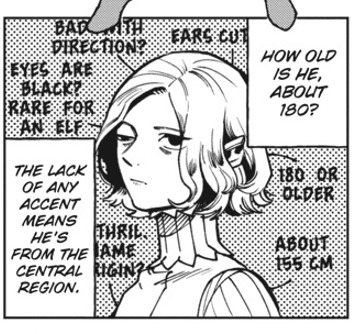
He treats him considerately and without bias, and despite the fact that Mithrun conquering the dungeon for the elves is both a reenactment of a core part of his childhood trauma and a political disaster for his aims, that doesn't seem to colour his perspective on Mithrun negatively at all.
This is something I find extremely laudable about Kabru, and it's another way he parallels Laios. He seems to understand that people, as a rule, (in Laios' case, he understands this about monsters - and eventually, all living beings) will act in their own interests, and if those interests conflict with yours, might harm you. But that's just their nature, and it's not something that should be held against them; you're also doing the same thing, after all. The crux of Laios' arc is precisely that he has to accept the responsibility of hurting someone else in order to achieve what he wants.
Kabru is deeply concerned with his own morals, what he should and shouldn't do, but mostly in the context of responsibility for the consequences - a responsibility he takes onto himself. He isn't scrupulous about what he needs to do in order to create the outcome he wants, but if he fails to create that outcome, then....
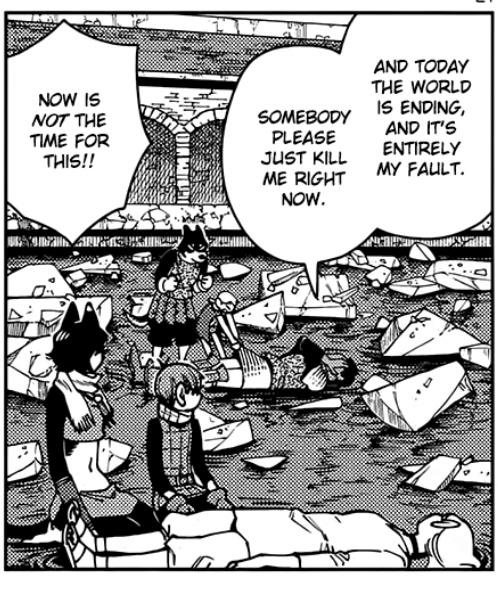
He blames himself to the point of thinking he should die. He doesn't blame Laios, or seem at all angry with him, despite concluding he should have killed him to prevent this outcome. That's because in his eyes, ultimately Laios was going to act according to his own nature, and it's Kabru's fault for not understanding that nature well enough. He's extremely confident in his ability to understand and predict others, (including elves and other long-lived people). Then, where does his conviction that mutual understanding is impossible come from?
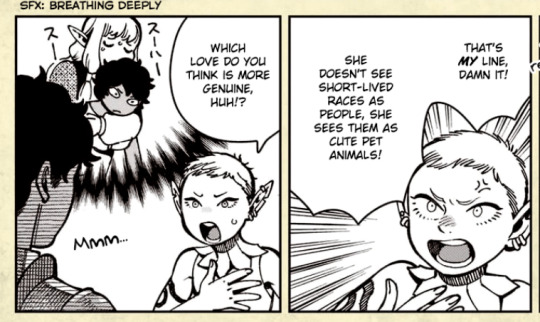
Partially, it's the "mutual" part. I'm sure Kabru, who isn't able or willing to deny Otta's insinuation that Milsiril saw him more like a pet than a son, has felt that his full interiority, the depth of his feelings and his ability to grow, act, and think as a fully equal being, was something that the elves around him just couldn't grasp. Because that was their excuse for it, he came to understand this as a gulf between short-lived and long-lived beings, an inevitable difference in outlook caused by their different lifespans.
This experience might be part of what leads to his iconic “fake” behaviour. He trusts his ability to understand others, but if they aren’t able to understand him, then there isn’t any benefit to being honest about his feelings and thoughts. If his attempts to reach mutual understanding with his caretakers were never able to be fulfilled, then it isn’t any wonder that he reacts with such surprise and horror at blurting out his desire to be Laios’ friend.
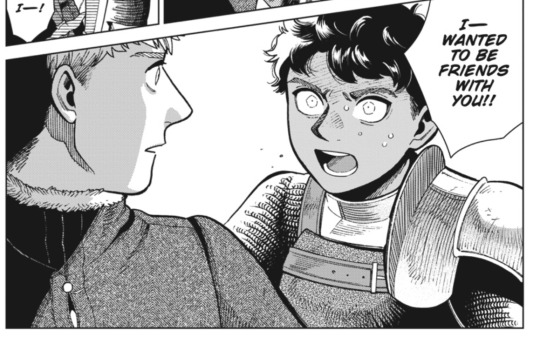
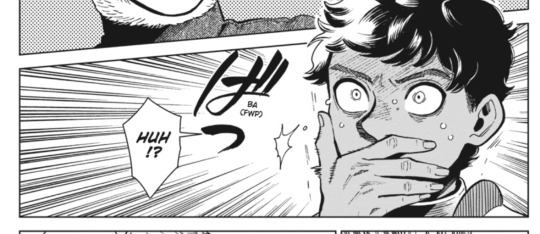
In his experience, making yourself vulnerable in that way only leads to being hurt. Soothing him, hushing him, lying to him, talking to him like a child that isn’t able to use proper judgement – that’s an inadequate and deeply hurtful way to respond to genuine distress, the desire for autonomy, or disagreement. Ultimately, I think that’s why he comes out on the side of being grateful to Milsiril; because she did equip him with the skills and knowledge he’d need to reach his goal, and let him go.
Though he could understand them, they couldn't understand him. To the extent that was true - which I'm sure it was - it wasn't due to anything about lifespan. It was due to the elves’ racism, and the solipsitic mindset & prejudiced attitude that it caused them to approach him with.
Because, if it needs to be said, the idea that there is an unbreachable gap in understanding between the long-lived and short-lived species is not true. Marcille and Laios have a much greater difference in lifespan than any full elf from any short-lived person, and they’re able to understand each other – maybe not perfectly, but better than many other people who are closer in life-span to them.
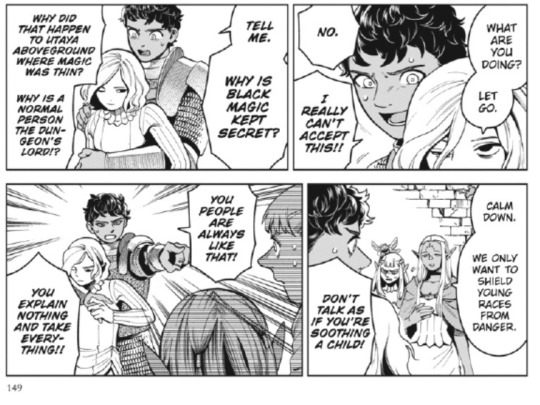
That doesn’t mean that I think Kabru is wrong about this, however. Because there’s an interpretation of his statement that is reflected in his actions and is true. When he talks about his problem with elves, it’s not just their attitudes: it’s their power, and what they use it to do. They “explain nothing and take everything”. Though it’s presented in the guise of ‘guiding and protecting’, in fact it’s a simple case of a powerful nation using their military power, wealth, access to resources, and historically stolen land – including the island itself – to protect their own interests and advance their own agenda. That’s why they’d be able to show up, seize the dungeon, and forcibly take Kabru’s party and Laios’ party to the West. If Kabru wants to stop that from happening, or change that status quo, persuasion or a bid to be understood would be completely pointless. Between the political blocs formed by long-lived species and the interests of short-lived species, “mutual understanding”, given their current, unequal terms, would be impossible. This is something that we see reflected in Kabru’s actions; before he asks his questions about the dungeon, he grabs Mithrun as leverage. He never really attempts to persuade the canaries to see his point of view, because that would be pointless: they’re agents of the Northern Central Continent’s monarchy, and will act in its interests regardless of any individual relationship with him.
I don’t think Kabru sees the different dimensions of this belief of his in quite such clear terms, however, as is evidenced by the other group who he thinks it’s impossible to communicate with.
Demi-Humans & Unknowable Objects
The other place that we see his conviction about the impossibility of mutual understanding is in the kobold extra.
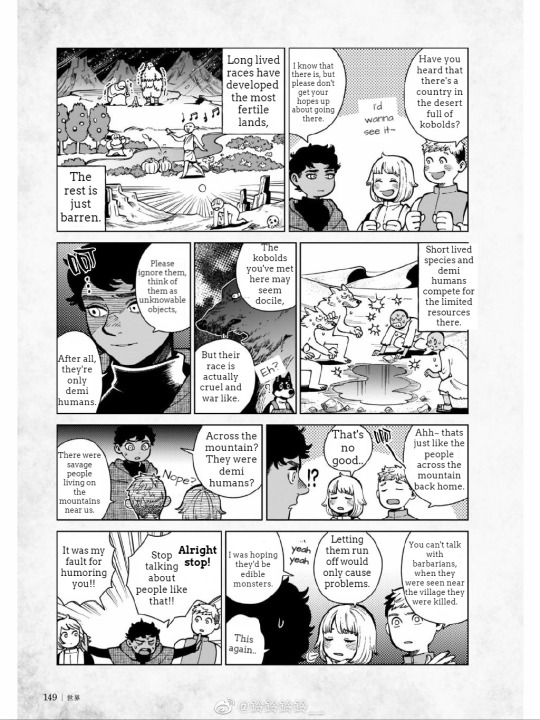
I'm including the whole thing, because I think it's an excellent and clever piece of world-building. Aside from what it says about Kabru, which I'll expand on shortly, what this extra does is deconstruct and call into question the usual "fantasy ontological biology" present in these sort of DnD-like settings. Essentially, the kind of worldbuilding where a race (such as kobolds) can be described as war-like, and that's establishing something essential about their biological nature. That's common to the point that if Kui didn't include this, some people would probably come away thinking that's the case about, e.g., the orcs.
But here, despite what Kabru is saying, the information the reader actually gets is:
the conflict between short-lived humans and demi-humans such as kobolds is mostly over access to material resources that they need to survive.
These resources are scarce because powerful nations, such as the elves, have monopolised them.
Kabru, who has grown up in a place at the centre of these conflicts, ascribes essential, negative traits to a cultural group which was in direct conflict with his own. Communication with this other group is impossible; they aren't people, they're more like objects.
oh yes! just like this conflict between groups of tall-men, a conflict which the reader will immediately interpret as more clearly analogous to real-life racism. Our other protagonists also carry prejudices from growing up in a place where a marginalised group was in conflict with the dominant group over scarce resources. It's definitely impossible to communicate with these people, and you can only kill them.
Woah, when you say it like that, it sounds pretty bad!
But also, nobody walks away having had a realisation or unlearned their prejudices - because they don't have the tools they need to do that work. Yet. I do think, to an extent, it could happen - especially with Kabru, since it's suggested in the epilogue that Melini might become a safe-haven for demi-humans.

To focus in on Kabru, the key here is his statement that you should think of demi-humans as "unknowable objects". Even his extraordinary powers of understanding have seemingly hit a limit. Part of this is just inherited prejudice, and doesn't need to have a complicated psychological explanation, any more than the elves who were prejudiced against him need one.
But also... this is probably somewhat linked to the way demi-humans seem to be considered "pseudo-monsters". They're the place that the strict delineation between the human and the monstrous is permeated. Laios, who is not interested in humans, remembers and is excited by Kuro. Chilchuck and Laios argue over whether it's OK to eat a mermaid. Kabru's prepared to (pretend to) roll with the idea that Laios ate the orcs.
But these are people, aren't they? Of course, this is a social construction, as we see from the fact that in the Eastern Archipelago, the label of "human" is reserved for tallmen, but in most of the rest of the world it depends on some obviously arbirary classification based on number of bones; "demi-humans" aren't in any essential way monstrous, except to an extent in their appearance, and physical location - due to their marginal social status, they're pushed out to live in unsafe places such as dungeons.
Therefore, Kabru's view of demi-humans as fundamentally "other", unable to be understood - monstrous - could be read as akin to abjection, the psychoanalytical concept described by Julia Kristeva. In order to create a bounded, secure superego, that thing which permeates and calls into question the border between self and other, human and animal, life and death, is rejected and pushed to the margin.
“Not me. Not that. But not nothing, either. A "something" that I do not recognize as a thing.[...] On the edge of nonexistence and hallucination, of a reality that, if I acknowledge it, annihilates me. There, abject and abjection are my safeguards. The primers of my culture.” (Kristeva et al., 1984, p. 11) “It is thus not lack of cleanliness or health that causes abjection but what disturbs identity, system, order. ” (Kristeva et al., 1984, p. 13) “The pure will be that which conforms to an established taxonomy; the impure, that which unsettles it, establishes intermixture and disorder. [...] the impure will be those that do not confine themselves to one element but point to admixture and confusion.” (Kristeva et al., 1984, p. 107) (discussing food prohibitions in Leviticus)
This is both (due to its affinity with food-loathing and disgust) a very fruitful concept to apply to dunmeshi, and a psychoanalytical theory which I wouldn't exactly cosign as True Facts About Human Psychological Development. You may also know the abject from its utilisation in the classic essay "Horror and the Monstrous-Feminine" by Barbara Creed - that's a lot more approachable than Kristeva if anyone's interested.
Key here, though, is that through the symbol of the "demi-human" is embodied a step between "human" and "monster" - and that's a prospect that puts at risk the whole notion of an absolute separation between those two categories in the first place. To Laios, that's something wonderful, and to Kabru, it's terrifying. We can see this principle further embodied in the relationship both characters have with the notion of becoming monstrous.
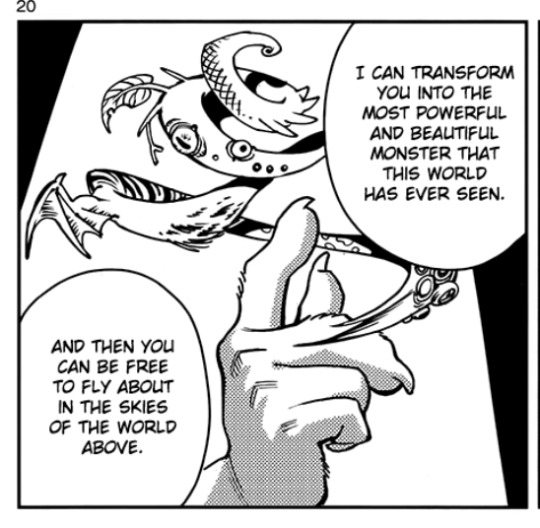
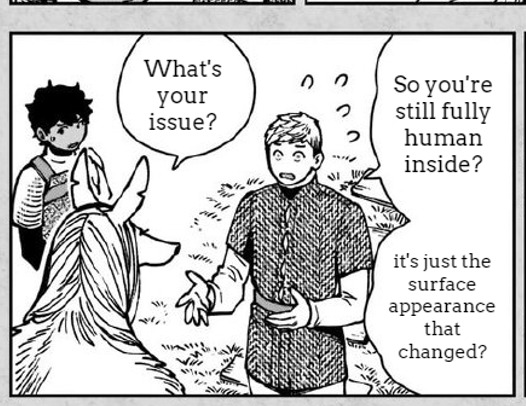
To Laios, this is transcendent, and represents a renunciation of everything human - in fact, if it didn't, it wouldn't "count".
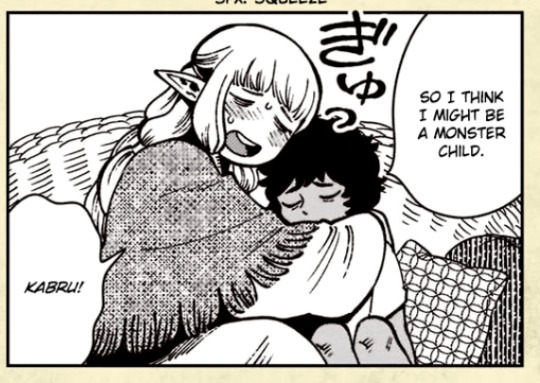
To Kabru, it's a deeply-held fear, established by his childhood alienation (due to his illegitimacy, his eyes, and perhaps also his neurodivergency), deepened by monster-related trauma and the sense of responsibility and survivors guilt he feels for what happened at Utaya. His identity as a human who is not monstrous is key to his sense of stability and safety; he doesn't want to touch monsters, he doesn't even want to see them.
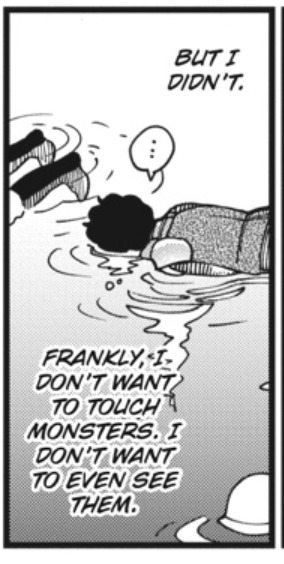
To acknowledge a kinship, a possibility of similarity between the things he loves (humans) and the things he hates (monsters) would be more than touching them - it would be putting them inside him. We know, quite explicitly, that this notion is triggering to Kabru. He literally has what seems to be a flashback when he's about to eat the harpy omelette.
So he abjects it, classifying the demi-human as fundamentally unlike him - an unknowable object, or an object that he refuses to know. Because in understanding it, he would interject the things he hates and fears into his self, which is already, always under threat by that hated and feared object.
Of course, again, Kabru isn't very good at enacting this refusal in practice. For one, when he chooses between his desires and ingesting the feared object, eating monsters... he eats monsters. Part of this is treating himself badly, the "ends justify the means" mentality. His goal is to destroy all monsters, so if he needs to become monster-like to do that, he will. But part of it is also the other motivation that he didn't even seem to know about until he said it: he wants to become Laios' friend, and to learn from him how a person can like monsters. He wants, at least in some part of him, to reconcile the feared and hated object into something he can understand.
For another:
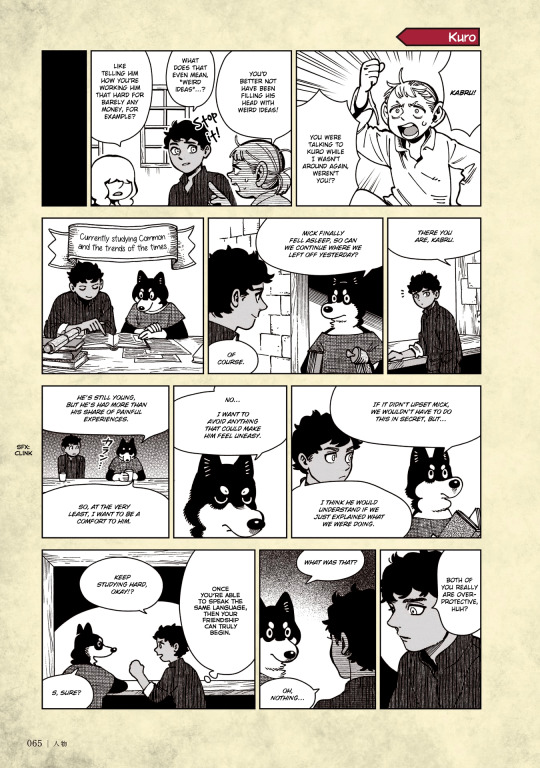
Kabru can speak the kobold language. In the first place, while this may have been common in Utaya, it also could have been something he chose to learn, an early expression of his interest in understanding and talking to all sorts of people. It isn't the kind of thing you learn if you believe that communication between yourself and the group that speak it is impossible, is it?
It's possible to harbour prejudices against a group while being kind to an individual, and given Kabru has those prejudices regardless of his reasons, that is what he is doing. But also, his treatment of Kuro doesn't reflect a sincerely held belief that he's an "unknowable object" at all. His approach is exactly the same as it is to any other person: an analysis of goal and motive, and an attempt to help if he's sympathetic and their goals align - going out of his way to give language and local knowledge lessons in secret. His conviction that Mickbell and Kuro will truly become friends when they can properly communicate is completely contradictory to any sense of demi-humans as fundamentally different, or impossible to reach mutual understanding with. To me, it seems like this self-protective shield against the corruptive force demi-humans as an idea present to his identity, this abjection, when Kabru is face-to-face with one, just simply can't hold up against his finely honed skill of intellectual empathy. Perhaps because he's autistic, it seems his "empathy" is less an emotional mirror response, and more a set of cognitive skills for analysis of others. That instinctual, emotional empathy might not trigger when presented with a member of an out-group, but if it’s possible for Kabru to turn his cognitive empathy off, we don’t see him do it.
This isn't to say that this prejudice doesn't affect his behaviour. For one, it could negatively impact his judgement of politics and policy, where individual people don't enter into it. For another, I'm not convinced he'd be willing to overlook Mickbell's exploitative relationship with Kuro if Kuro wasn't a kobold. As it is, since both of them are satisfied, he doesn't feel like he needs to intervene, regardless of the fact Mickbell isn't paying Kuro. But if Daya and Holm were in a relationship, and Holm took both Daya's and his own share from their ventures, but only compensated her in living expenses and kept the rest, do you think he'd tolerate it, for example? Even if she said it was OK?
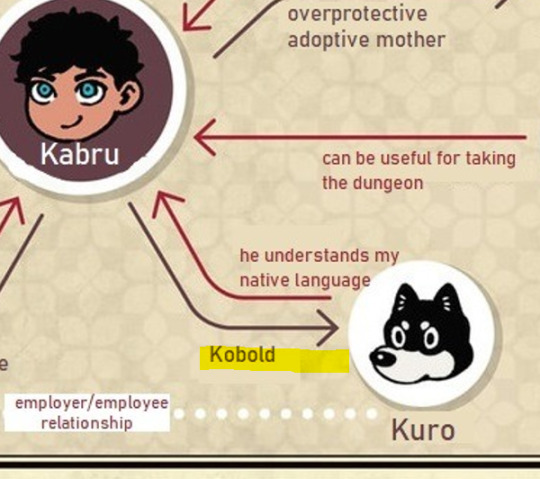
Conclusion

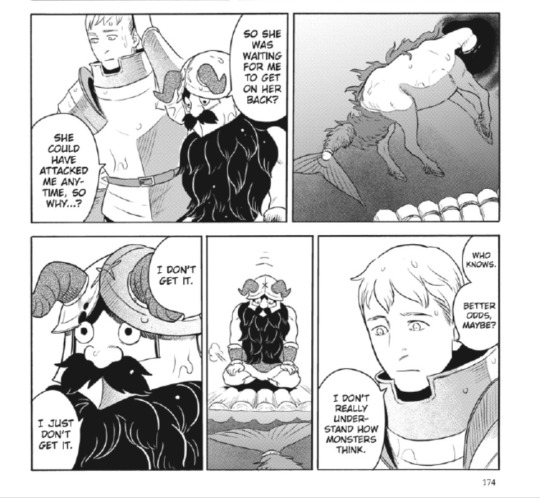
The kelpie chapter establishes that "people can never know what monsters are really thinking." That isn't just true of monsters, though.
True mutual understanding is impossible - between anyone. We can never truly understand another person's heart. This is touched on in, for example, the existence of shapeshifters and dopplegangers. Even a monster that seemed like a perfect copy of a person wouldn’t be that person, and wouldn’t be a satisfactory replacement.
We’re intended, I think, to understand the winged lion's repeated suggestions to just replace people who have been lost with copies as something uncanny, which demonstrates the way that the winged lion never manages to attain a complete understanding of humans. A version of a person who was created to fulfil your memories of them, to be the person who you wanted them to be, would be a terrible, miserable thing.
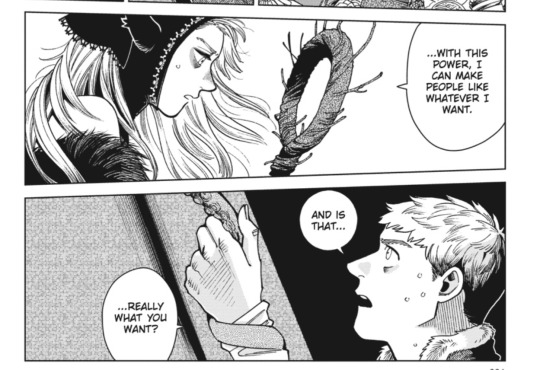
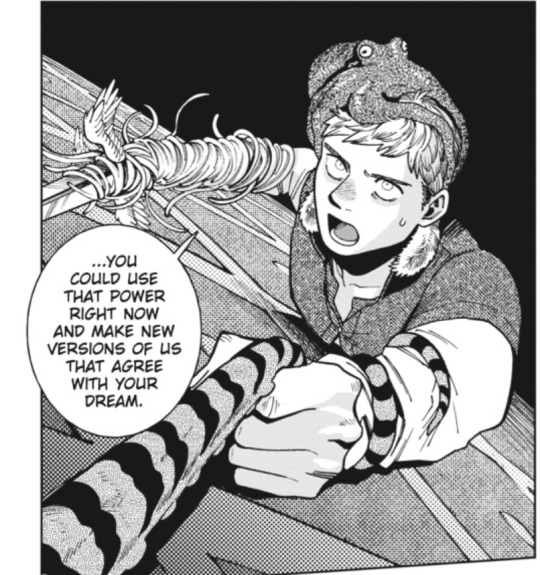

Disagreeing, coming into conflict, and misunderstanding each other, are essential parts of what it means to be living beings, as fundamental as the need to eat.
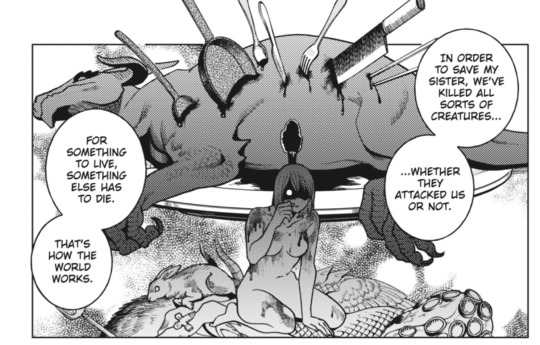
The only thing to do is not to take more than you need to eat to survive, and not impose your own desires onto others. To do your best to sincerely communicate your desires, even if they're embarrassing or vulnerable or strange, like Kabru eventually does with Laios; like Laios does, bit by bit, with the people around him; like Marcille does, Chilchuck does, Senshi does... to hope they will accept you, and do your best to understand them in return.
We can re-examine, in that context, Kabru's line about the elves' tendency to "explain nothing and take everything".
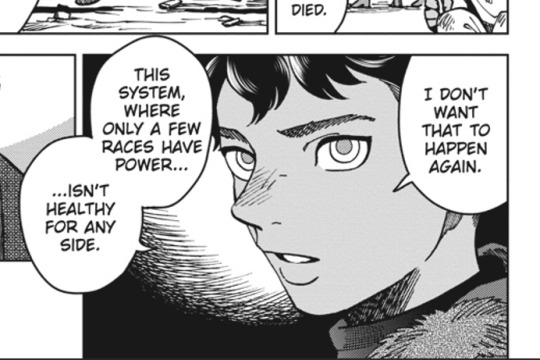
They have the power to impose their preferred "menu" onto less powerful groups. And in that context, mutual understanding being impossible just means that they won't give up their power because they're asked nicely. Kabru's goal is to seize the truth that they won't give to him, and to create a situation where they can't take everything. Because he's accurately surmised that nothing about the treatment of short-lived races will change so long as the power imbalance remains. Despite the way he mistakenly ascribes part of that to "long-lived vs short-lived" or "human vs demi-human", the actual gulfs in understanding he identifies are structural, are about power and about access to material resources and safety.
I think he could come to recognise this. Yaad is teaching him political science after all, and while a prince's lessons on political science won't exactly get at much that's radical or invested in the interests and perspectives of the marginalised (Capital is a critique of for a reason after all...) I believe in Kabru's ability to learn critically and get more from a lesson than it was intended to teach.
#og post#kabru of utaya#kabru dungeon meshi#laios touden#dungeon meshi meta#dungeon meshi#dunmeshi#dungeon meshi manga spoilers#dungeon meshi analysis#kuro dungeon meshi#the canaries#milsiril#continuing to develop my kabru theses.#literally sitting and thinking about kabru all day. rotating him.#he's in the microwave. to me.
2K notes
·
View notes
Text

I was today years old when I was reminded that Sebastian held up rCiel’s still warm corpse before oCiel in a fucking crucifix pose.
…Oh no. This wasn’t gonna be analytical but I feel it bubbling up within me. Damn it.
The context of this scene was that Sebastian had just told oCiel / oCiel had just realized that he’d summoned a demon through sacrificing his brothers soul. He is immediately in denial of this, understandably, that was not his intention.
So what does Sebastian do? Forces him to gaze upon the dead body of the very soul he was summoned with. Putting him into that very specific pose.

He could have just held him up limply as we see in this part of the panel, but no. He raises rCiel’s arms to make a pose that quite literally symbolizes sacrifice.
Urrrgg make it stop.
I bet that Sebastian, having been summoned into a room full of English speaking white people, could easily deduce that he was in a country where the main religion is Christianity. And that, therefore, this (soon to be) new little master of his practiced that faith prior to the whole denouncing god thing.
I’d like to think that Sebastian, given that knowledge/assumption, chose to put rCiel in that pose very specifically. To take advantage of oCiel’s subconscious knowledge of its symbolism in order to emphasize that he was responsible for him being there. He was the one who sacrificed his brother, not the cult (In a sense).
Why? Cus he’s a fucking dick.
Now, if this scene had taken place BEFORE the reveal of rCiels bazar doll. I would be going on about how it was foreshadowing his resurrection. Cus, you know, rebirth of Christ. Maybe it still is? Alas…
#I see a tiktok then make an analytical post#the cycle continues#(sigh)#I’ve been thinking to much abt Kuro and religion lately#black butler#kuroshitsuji#sebastian michaelis#ciel phantomhive#ociel#rciel#real ciel#our ciel#black butler analysis#my analysis
658 notes
·
View notes
Text
VAIN — a kuro analysis of sebastian's character and his relationship with ciel

hi! so i've been wanting to make an analysis post for SO long but didn't really know where to post it, but tumblr is always here to answer my prayers. i just want to preface this by saying this is all my personal opinion and what i've taken away from the kuroshitsuji manga. there are so many layers to sebastian's character and his relationship with ciel, so many angles to analyse it from, they are extremely complex characters so there isn't one true take of their characterisation.
i'd be happy to discuss any disagreements or even other opinions you might have with my points in a civil manner. that's the beauty of media literacy!

my take on sebastian character!
sebastian is a really interesting character. being the main protagonist of black butler, it's surprising we don't know much of his origin or past—all we have of his character is how he behaves and interacts with characters now, and i'd like to further delve into this.
but from what we do know, sebastian is a hyper narcissist. he's unable to feel shame and thinks he is above everyone else; as illustrated and stated by the creator. most of sebastian's character is revealed through his relationship with ciel—which is the main centrepiece of the story—and how he behaves with him, as ciel is the only person (aside from the obvious exceptions) aware of sebastian's true nature and intentions. despite his "caring" facade towards ciel, sebastian is simply acting on the contract for his own best interest, and even ciel is aware of this fact which is why he rarely lets his guard down around him. his great means to preserve ciel's life is to preserve his soul, after spending the last 3 years cultivating it for him to devour after fulfilling their contract.
sebastian is too wrapped up in his own affairs and self-absored nature to even consider other people's concerns. he only feigns care for ciel due to his duties as a butler and maintaining the "aesthetic". the reason why he's so comfortable being in such a subservient position is because he knows deep down that he is above all humans. the best way i can describe this is a little odd but it's like when celebrities work at minimum wage jobs just because they can, not because they need to but because they know they're above these types of jobs with their level of wealth. they willingly put themselves in these degrading positions as they're comfortable enough with their wealth to be able to for fun. that is sebastian's case. he is comfortable enough with his power and tact as a demon to be able to don a tailcoat and play as a servant to the very species he sees himself above.
on top of that, sebastian appears to believe he is above those of his own kind, claiming that such gluttony goes against his demon "aesthetics" which is why he has invested so much time into cultivating ciel's soul instead of feeding off of multiple contracts. it reveals why sebastian is so into the "butler aesthetic" and finding himself in such a degrading position for one of his own kind. he seems to prioritise elegance, not greed, when it comes to fulfilling contracts.
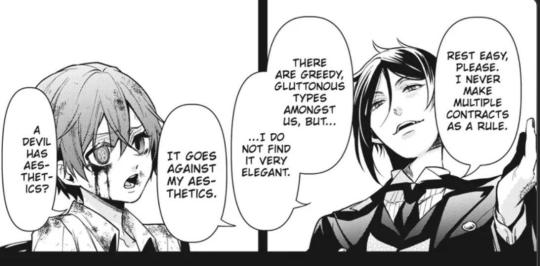
however, sebastian's true nature is more prominent in the flashback sequence where ciel first summons him. he is extremely cocky, trying to manipulate ciel for a quick and easy kill such as when he was eager to kill everyone who has caused him harm, which does, in fact, reveal that he is not unlike most demons. the reason why sebastian picks such an appearance all ties into his narcissism, he gets off on impressing humans with his supernatural skills and ciel is only one who seems to understand that part of him, but it's always played off for comedic effect. sebastian soaks up in the praise he is given by these "puny" humans, always hanging onto their last words of flattery which reveals his true vain nature and that he is not as elegant and collected as he seems.

the fandom's take on sebastian!
i think the reason why the fandom is so fixated on sebastian's character is due to a myriad of factors. it can be due to how well he's able to play his facade; he's charming in a way and knows how to use his words to get into people's good graces, wielding his "elegance" and "aesthetics" to his advantage. as sebastian is forced to pretend to be human for the sake of their contract, he is able to analyse the qualities in people that others would want to see and apply that to himself. he's able to feign morality and charisma—partly due to his butler aesthetics but also for his own self-serving nature and receiving praise.
another reason why i think sebastian is the most popular character amongst the fandom is, yep, you've guessed it, his appearance. sebastian's appearance is no accident—both in his character's creation and the form he chose for himself in the story—he wields his sexuality and attractiveness to his advantage. his true nature and appearance are disgusting and unsightly, which is why he covers it up with a beautiful face; making it easier to deceive and manipulate.
however, the issue is with the fandom is that i think sebastian has the epidemic of what i like to call "attractive justification syndrome" where the fandom goes to great lengths to justify sebastian's actions and refusing to acknowledge his character for what it is—a self-absorbed, predatory narcissist—because he's attractive. however, sebastian is BEYOND morality and clearly lacks any remorse of his irredeemable actions. he doesn't feel shame and doesn't care to; i feel as though just because he's attractive, fans try too hard to defend him. don't get me wrong, i enjoy sebastian's character as well and i'm no different in admitting he is attractive, but i think he's extremely interesting and does explore different ideas of morality (more so, lack thereof) but i think it's rather off base to try and defend his character.
i think the bigger issue is that people tend to think enjoying his character says something about them, instead of what it says about the story. they're too afraid of liking his character for what it is. as they're scared of what that'd say about them for liking such a terrible person of a character. on tiktok especially, i feel like many fans sometimes try a bit too hard to have a moral high ground that they refuse to acknowledge the darker side of sebastian's character as then there goes their reason for liking him.
the anime adaptation doesn't help with this issue either for why sebastian's true character has been heavily lost. i feel as though they're eager to add some sort of movement or emotional depth to his character, which defeats the purpose of it. sebastian has a very static character, he doesn't have the emotional capabilites to feel empathy, he can sure as hell pretend, but at the end of the day, he's only here for his own best interest.
this is especially evident in the translation change in the public school arc where in the anime, sebastian justifies protecting ciel instead of chasing after undertaker because "he's spend too long raising him", whereas in the manga, sebastian justifies it for the true reason, which is because he's "spent too long cultivating his soul and won't let himself be robbed of it". there is a distinct difference as in the anime, sebastian appears to care for ciel's actual wellbeing, whereas in the manga, sebastian has established the foundation of the contract and how he's only preserving ciel's life for his soul.
anime translation

manga translation

my take on sebastian and ciel's relationship!
it is no surprise to say that their relationship is extremely unhealthy. due to the imbalance of power dynamics between them, there will never reach a point that their relationship turns healthy. it may look like ciel wields the power through their master-servant dynamic, but peeling away at this layer will reveal the foundation of their dynamic, being human-demon. but these are obvious points. sebastian wields his power as a demon to subtly manipulate ciel—his suffering and misery acting as a marinade for his soul. sebastian has no interest in ciel's wellbeing and, in fact, goes out of his way to contribute to his trauma.
a good example of this would be in book of circus during ciel's ptsd attack where he relives his trauma of seeing his brother be murdered in front of him. ciel is completely vulnerable, reaching out helplessly for anyone to help him and sebastian feeds off of his misery, caressing this child's vomit-coated lip and getting him to call his name when he is unable to speak. the scene is extremely grotesque and uncomfortable to watch as we see this adult practically looming over this defenceless, traumatised child who his gripping onto him for support. i usually dislike giving yana credit as she has done a pretty bad job illustrating their relationship with the unnecessary icky fanservice and horrible attempts of incorporating psychosexual elements into the story but i believe this scene was intentionally drawn this way to reveal sebastian's predatory nature. it's supposed to make you feel disgusted as sebastian uses ciel's codependency on him as some sort of power trip, feeding off of his trauma.
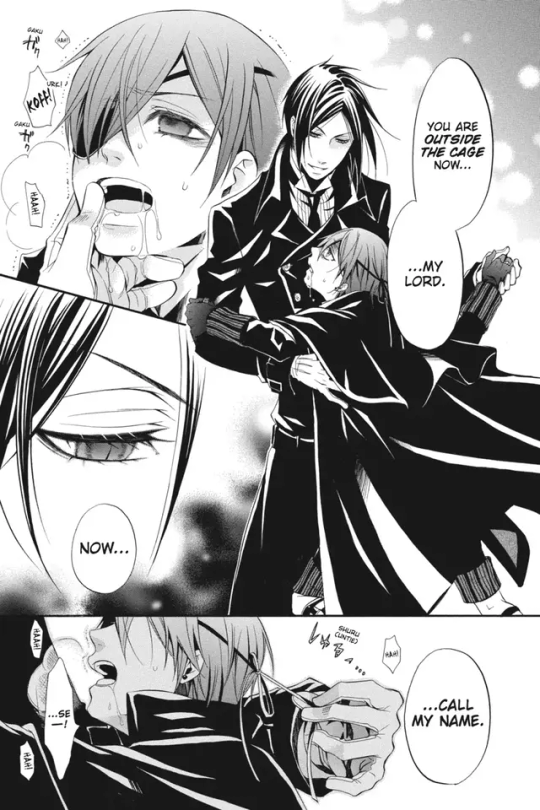
i got this point from a wonderful friend who i've analysed the story with, but sebastian is indeed a predator. he is textbook definition grooming ciel. he may not be sexually as grooming falls under the definition of "preparing/training someone for a particular purpose or activity", but his relationship with ciel is for the sole purpose of being able to devour his soul at the end. when sebastian was referring to "cultivating his soul" in the public school arc, he meant spending years using subtle manipulation and grooming tactics to get the desired flavour of ciel's soul.
just because ciel was aware of the terms and conditions of the contract, aware of his impending doom, it doesn't make sebastian's actions of preparing a child for death any more morally fine. the foundation of the contract was never fair; ciel had no choice. it was either sebastian left him to die in the cage, or he was to form a contract with him to gain the power to come back. all the power ciel has is not his, and one day, that power will be stripped from him, and he will have to face the one who gave him this power. it is the reason why ciel does not choose to pursue happiness after coming back, as he knows that if he even gives into the idea, sebastian will automatically assume he's abandoning his revenge and kill him. i'm not saying ciel is devoid of faults either, everyone in this show is morally grey and he can cause his own suffering too, but this is a sebastian-focused rant so i'll go deeper into this some other time.
i think the reason why dadbastian is such a popular headcanon, especially on tumblr, is because it subverts the unhealthy, grotesque aspects of their relationship and provides ciel with a healthy parental figure which he has been needing, giving him the solace he deserves from all his trauma. not to mention, there are scenes in the series where sebastian does act as a parental figure towards ciel. don't get me wrong, i ADORE this headcanon and will go down with it but i think the darker reality of their dynamics in the manga is the reason the headcanon is even more upsetting as we know it will never happen and this child will never get the peace and happiness he deserves.
TLDR; sebastian is a hyper narcissist and is there for nobody's best interest but his own, the only reason he goes to great lengths to preserve ciel's soul is because their contract wouldn't be sustained otherwise. the fandom tries to justify and defend his actions too much due to how well he's built his facade of desired human behaviour and his attractiveness. sebastian contributes to ciel's trauma, subtly manipulating him and mocking him for being taken to his limit. their relationship is extremely unhealthy. dadbastian reigns supreme because it subverts the grotesque factors in their relationship.
thanks for taking the time to read this if you've made it this far! i'd love to hear any of your guys' opinions and takes on their characters.
#this is a long and overdue rant#essay#character analysis#sebastian is a narcissist wbk#again please feel free to share your own opinion! i'd love to hear them#idk these aren't really shocking takes i feel like most are aware of these#but i wanted to string these together into one coherent essay#i don't have the hyperfixation the hyperfixation has me#these are the fruits of my kuro obsession oh lord#black butler manga#dadbastian#sebastian michaelis#ciel phantomhive#kuroshitsuji manga#black butler#kuroshitsuji
228 notes
·
View notes
Text
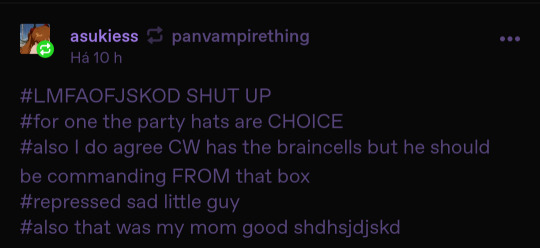

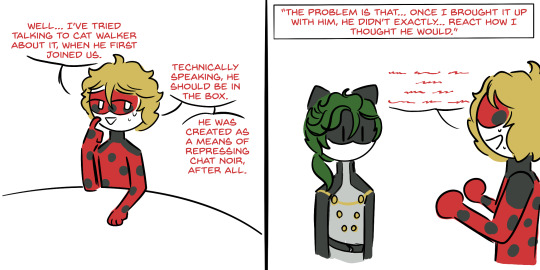


I fully agree, he belongs in the "oops, all trauma!" box. But who's gonna have the courage to put him there.
-
jokes aside like ok im about to go on a rant about Cat Walker
we joke about chat blanc being the scariest one and all but i actually think Cat Walker is easily the most disturbing persona of Adrien. To me personally
like sure Chat Blanc represents a lot of his anger and rage and abandonment. and Claw Noir does that too only in color and lipstick. but Cat Walker being the literal representation of Adriens ability to just, repress himself on command. to just shut off a huge part of his identity (Chat Noir) for what he fully believed to be forever. and easily start acting like a completely different person (Cat Walker) is so. incredibly disturbing to me.
like yeah the episode frames it lightheartedly but the IMPLICATIONS ARE THERE.
cat walker stares at the fact Adrien is so willing to abandon himself, to replace himself in people's lives, to stand by ladybug as a completely different person because thats what he believes she wants from him, to easily live behind layers and layers of masks, and he simply goes "i choose to not perceive that" and i think thats fucking wild man.
so yes, he does entirely belong in the box, but he sure as hell aint gonna admit it, because his whole thing is being the representation of Adrien's repression and covering up his problems. He's not gonna admit he has a problem. So if you try to stage a coup, YOU'RE going in the box, bucko.
#anyway if its not obvious i love Cat walker and I know hes a silly little guy#but he should be allowed to be a little disturbing. just a bit. as a treat.#ml spoilers#sort of#miraculous ladybug#my art#lily doodles#this is a little au now i guess haha#Mind Palace AU#i think thats a good name yeah#mister bug#cat walker#adrien agreste#mlb analysis#kuro neko#cat walker analysis#adrien agreste analysis#he IS a sad and repressed little guy
604 notes
·
View notes
Text
Yet another proof of Sebastian's character growth. And I will not shut up about this subject because that demon went through so much character development in the span of 8-9 months.
The demon went from this...

To this...

I've been wanting to talk about this for a while.
In the curry arc, as you can see above, Sebastian talked about how nobody would serve another without a reward. His very contract with Ciel is the example of this. At the end of the contract, he will be rewarded with Ciel's soul. He wouldn't have served Ciel so faithfully without that.
But in Green Witch arc, he got down to his knees and offered his service to Sieglinde. What was his reward?
Ciel's recovery.
Now, when Ciel was reduced to that state, Sebastian wasn't obligated to continue to serve him. I'm not a demon, but even I could see the gaping loophole in the size of black hole that he could've taken advantage of. He could've taken Ciel's soul right there and right then.
But what has stopped him?
2 things:
1. His aesthetics
2. His growing care for both Ciel and his role.
What would he get from offering his service to Sieglinde? Nothing!
Not for himself, anyway...
He didn't offer his service for free. But for once, the reward is not his own. He offered his service in exchange for Ciel's well-being.
This is the very panel that goes against those who said that Sebastian hated Ciel and only saw him as a meal.
If Ciel was just a meal for him, why would he lower himself to serve another without gaining anything for himself? Why would he make a deal with Sieglinde? Even a three years old knows that nobody would enter a deal with another without a reward.
But this time, he's not doing it for himself. He did it for his young master. So, for those who said that Sebastian was a selfish bastard, you're right.
He's still selfish. That's his nature. Selfishness and arrogance are Sebastian's greatest character flaws. He liked this game so much, he wanted to keep playing butler, which is kinda weird, but hey, I won't judge. Ciel's calf and the sex must be worth it.
However, you're also wrong to say that he's still the same self-serving bastard who made a contract with Ciel three years ago. He's gone from thinking only about himself to willing to lower himself for his young master's sake.
107 notes
·
View notes
Text
Short answer, no, it's highly unlikely.
Long answer below the cut...
The first time Sebastian thought about breaking the contract was during their first weeks together, but then Ciel put him right in his place and surprising him by being steadfast in his decision to get his revenge.
But the first time that Ciel showed any sign of weakness (that we know of) was when he didn't use his gun on Madam Red. I don't buy his excuse about how he could see hesitation in her eyes and all that, I think Seb was right in assuming that Ciel hesitated because she was family. But he let that go.
And then, there was that infamous PTSD scene in the Circus arc. It was the first time that we see Ciel truly broke down. However, Sebastian was quick to rectify the situation and presented himself as Ciel's strength, reminding the young earl of his presence and his power and their contract. And right after that, Ciel had yet another moment of weakness when he ordered Seb to burn the place down. Yes, I called it a moment of weakness, or at the very least, an impulsive decision. Ciel wasn't in the right mind to decide on those children's fate. At that moment, he was driven purely by his impulses to burn the place down in an attenpt to forget about that place and what had transpired there.
Now, those might be Ciel's moments of weakness, but he managed to recover and show Seb (and himself) that he's still on his path to revenge.
However, the real turning point for them was the Green Witch arc. We all know what happened and how it ended and I still believe that without that particular... incident, their bond and their relationship wouldn't have been where it is right now.
Sebas could've eaten Ciel and ended their contract right thrn and right there. But he didn't. All those little moments of weakness in the past had given Sebas hope that his young master was still in there somewhere. He just needed to coax him out. Granted, his method is highly questionable, but hey, it worked, didn't it?
The thing about Sebaciel is that they're the only ones who knows each other's true self. The younger twin was weak and sickly and he saw himself as nothing more but his brother's spare.
However, in the past three years that he'd been with Sebas, he's grown into his own person. He's no longer that shy and fearful little boy, but he's not 'Ciel' either. He is his own person and Sebas recognized that too. And of course, I've talked a lot about Sebas' own growth, so we wouldn't rehash it all over again.
But then... The zombie brother came back and we saw how shocked and devastated Ciel was. During their confrontation in the manor, and then when they were on the run, and even until they got to Lau's place, Sebastian had taken over the control and he was the one who decided on their next course of action. He recognized that his master was not in the state where he could think clearly, let alone to decide on things, so he did that for Ciel.
During this time, we saw Sebas throwing glances at Ciel. He must've thought - however fleetingly - that this was it. Ciel wouldn't recover from this. But he did nothing to show that he was going to end their contract. Instead, he still took care of Ciel and he was even ready to take him to Germany, which meant that there's a possibility that Ciel might not continue on his quest of revenge or it might get delayed indefinitely, which means that he'd have to wait that much longer for his meal.
And then, Ciel pulled through yet again and it cemented Sebas' own resolve that Ciel is worthy of his service and devotion and love.
In conclusion, Sebas is the only one who knows Ciel best and he knows that no matter how many times Ciel falls, the boy would get up again and again and even if he couldn't, well, that's why Sebastian is there, to help him get up.
another question for the squad
do you think it's likely for Ciel to truly disappoint Sebastian? I for sure know he could at the beginning and even in the middle of manga but as of right now do you think Sebastian can truly make a 180 bc he sees something he despises in ciel?
bc to me Sebastian kinda puts him on a pedestal and expects him to act accordingly, he should be cunning, determined, strong-willed, prideful and in control.
So what happens when he's not and it's not just a moment of weakness to overcome but a real change of character due to some circumstances.
Kinda silly to say but I want to believe that the connection they have is unconditional, but that's the romantic in me talking.
It is very much conditional and if these conditions aren't met, what happens next?
80 notes
·
View notes
Text
The Tiniest Analysis and Headcannon:
As you’re probably well aware, Black Butler has more “Being Devoured” allegories than a Hannibal episode. But there was one thing I noticed and hear me out:
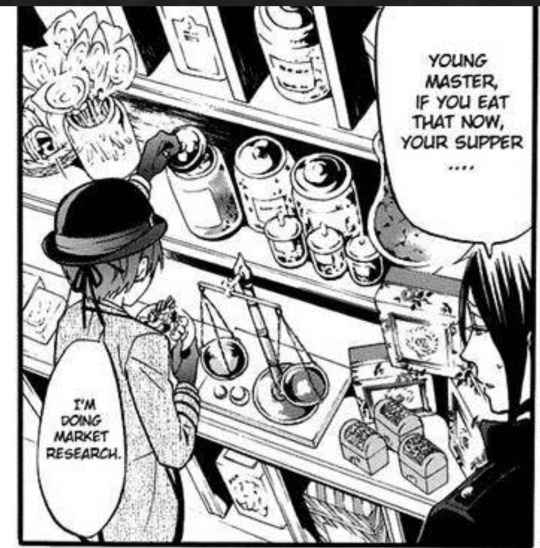
Ciel loves his tiny little treats. He’s always sneaking them, as well, most kids his age will. And throughout the series, Sebastian is always chiding him about this.
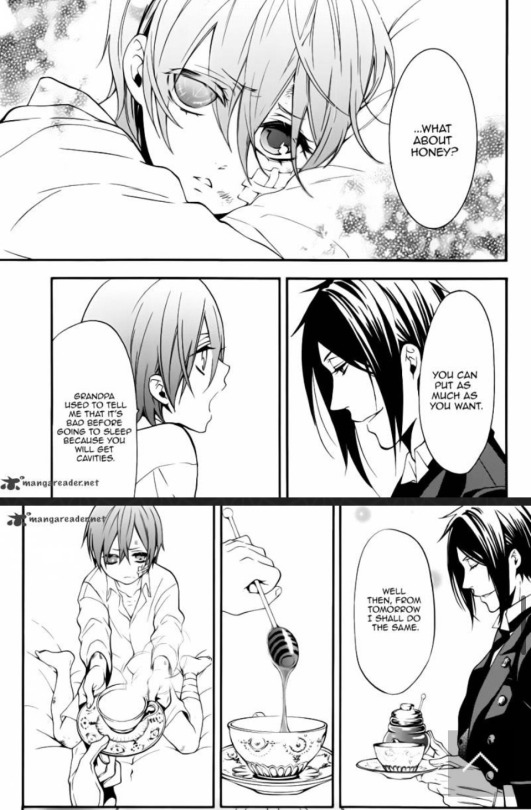
I originally thought this behavior was because Tanaka never spoiled o!Ciel due to dental hygiene (and maybe illness reasons). From this conversation Sebastian probably is following in Tanaka’s Footsteps as a “Butler” however….
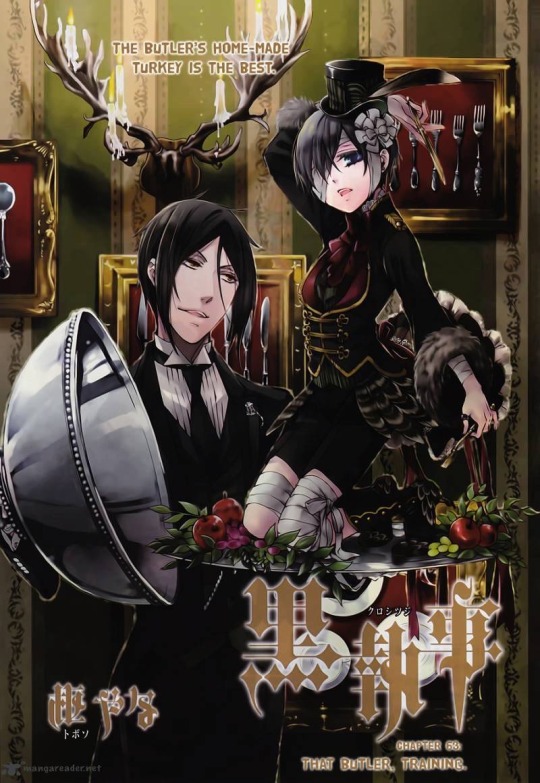
I wonder there’s also an Allegory here. Ciel can eat anything he chooses, except his tiny little treats (when he wants to). As Sebastian can kill anyone he pleases, except for his master. In the cover art, Sebastian likes to dress Ciel up in outfits that match his food, (Thank you @mister-astringent for pointing this out in this post!) I wonder if the restriction is a purposeful mentality.
“If can’t indulge, then neither can you.”
#kuro analysis#it’s not that deep analysis but#look!#tiny little treat time#Sebaciel#< for containment purposes
104 notes
·
View notes
Text
a short analysis on the theme of kindness in kuro, in defence of the morally reprehensible protagonists.
i previously spoke about sebastian pulling a "not like other humans" line on ciel but the things he's actually saying in this chapter are crazy...
chapter no's and pages in alt text!!
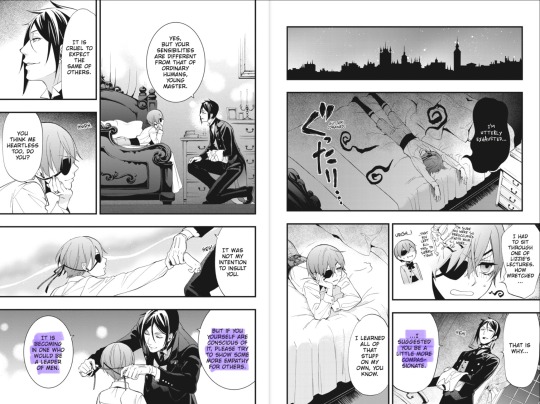
media illiterate (most kuro fandom antis') logic is that ^this guy's^ the big bad villain of kuro, there's so much to analyse about the theme of kindness and humanity in kuro but ultimately people are blind to it because sebaciel are not the kind, happy-go-lucky type of protags many people are used to and people struggle to purify them. there are so many people in this story "more innocent" than them and less morally grey which makes them look like worse people but the fact is that they are the "worse" in a world full of the "worst". they're there to show you how despicable humanity can be but they have their moments of 'good' (otherwise they'd be lacking in likability), especially moments like this can be quite odd in this story about corruption and evil because in those pages, these two do not seem like the deplorable, manipulative and conniving characters we often see them as. this moment reminds me of another very dear chapter to me which two volumes comes after this.

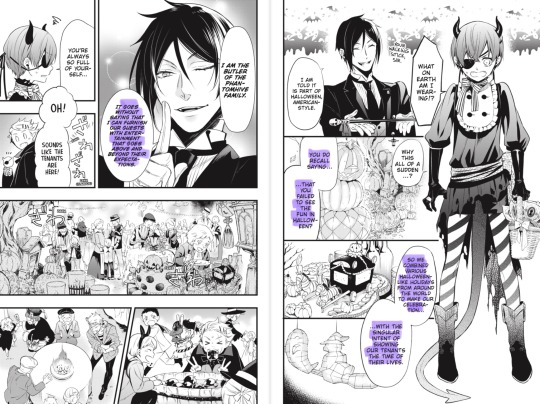
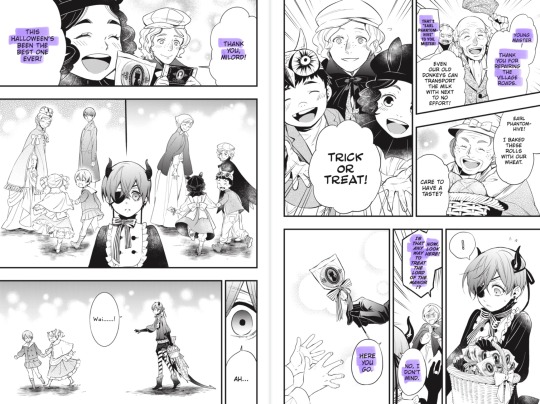
this is such an interesting part of the manga (it's why the blue cult arc is my favourite arc of the manga despite all the popstar/idol shenanigans that threw a lot of people off). the way these two behave in this arc is not normal, they do not need to go above and beyond for these people. it is not necessary for sebastian to go this far for ciel AND his tenants (who it is important to note he has no contractual obligation to care for, especially not to the extent of giving them the "time of their lives") and it is certainly not normal the way ciel treats these people with zero contempt even when they 'disrespect' him as a noble. these two are genuinely weird for their time, blue cult arc also gives us an unforgettable seb moment (link).
this chapter also serves as part of the transition between the blue cult arc and the blue memory arc which is also...
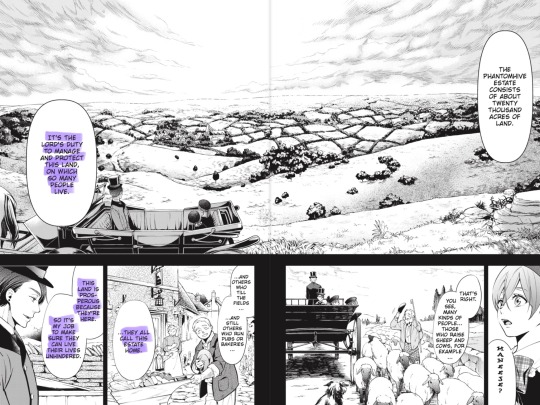
one of the most intriguing parts of the manga... what's interesting here is that ciel HAS kept his tenants happy as proven by the halloween chapter (the page below from this same chapter talks of infrastructure needs having to be met and we read that ciel has fixed the roads since becoming earl and even an old donkey can transport milk from across them- that's how good the quality of the roads are). however, what i want to focus on is undertaker previously saying ciel, despite having phantomhive blood is not like his predecessors. in fact, the flashback chapter shows he's not even like his own identical twin brother!
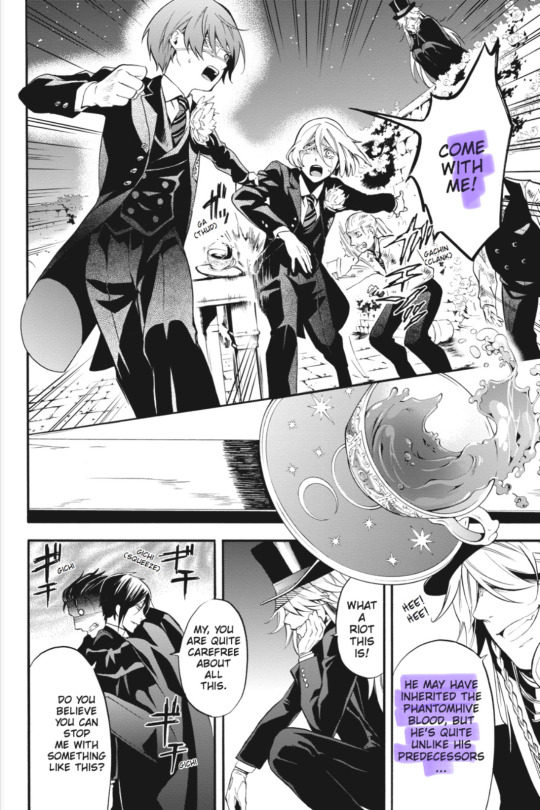
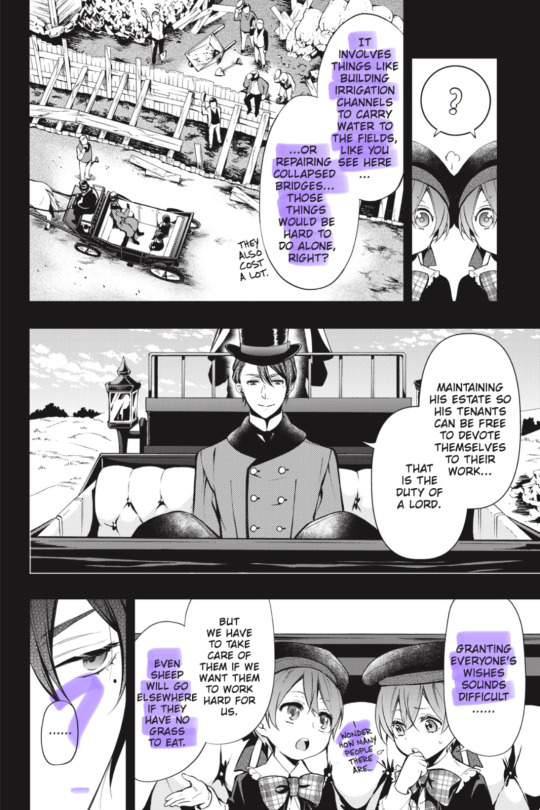
i really wonder what exactly undertaker meant by saying that right as ciel saves joanne in the school arc and also what vincent was thinking about his sons in this flashback sequence. did vincent think o!ciel is different too? and what is it that makes him so odd? or rather, what makes him an exception in the phantomhive family? i look forward to whatever yana has in store for us and hope to see where these wonderful characters with such bizarre morality (or lack there of) end up.
i will talk about this theme more in the future but if anyone has something specific to add, please do. and even if it's not too detailed or you're unsure, feel free to tell me what you think about the use of 'good' and 'evil' for the main characters of kuro overall! some things to consider:
fundamentally why are ciel and sebastian the way they are? and more importantly, do you think yana intended either of them to be read as strictly "evil"? a lot of people make the case of the fandom purifying them but i never see that these days, usually it's only ciel that's sanitised of all sin and sebastian that is demonised (although occasionally both are demonised as solely "bad guys"). i joke about them being narcissistic and not the nicest people (which is something i genuinely believe) but i do not think they are the root of all evil; which is a take you can have without absolving them of any and all misdeed they may have committed. i think what i'm really getting at is that sebastian is not ""evil""? and he's not innocent either. but he's a force for "good" in the story. he works for the phantomhive estate and the people living on that land more devotedly than a demon with a 3-clause contract with the master of the land should and he shouldn't be excluded from the phantomfam and only seen as horrible/evil but nor should he be solely seen as a silly little cat loving parent. and you don't need to ship sebaciel to see him this way, just read the source material with your eyes peeled, really think about what sebastian does and says. he's so interesting and he's so much more than the fandom makes him out to be. but interpret him however you want, i guess.
#general tags bc this is important#uhhh sbcl mentioned but not in the romantic way#but i ship them so dni if ur gonna be weird about it.#if you're gonna be civil then go ham on this post!!!#kuroshitsuji#analysis#sebastian michaelis#ciel phantomhive#black butler#syanalyses#character analysis#i promised to do this kuro analysis last year#here we are#undertaker#vincent phantomhive#real ciel#our ciel
151 notes
·
View notes
Text
About Kuro 2024 episode 6 : Ed's genius ability
(Companion post to this one)
I was looking forward to this episode and I'm so glad they kept Edward's pivotal moment...
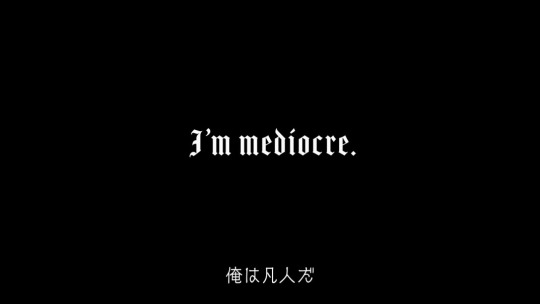
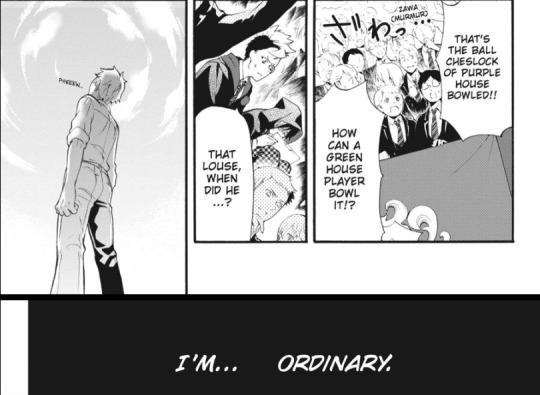
...totally uncut. It's especially striking when a few other manga scenes didn't make it into the episode.
I know fans like to joke that Ed is too much of a good guy (and also gay), which is how he managed to reproduce Cheslock's cricket move, but that's not it :

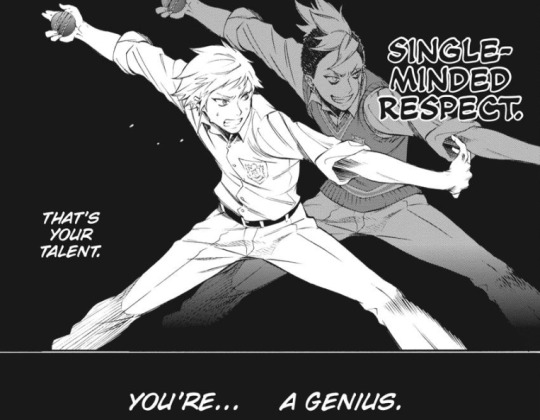
Like Liz, Ed is a genius, even if he doesn't realize it yet. And I'm glad that Editor K commented on this anime bit with this :

"There's one person in all boys' manga who has the ability to copy. This special skill is explained in the cricket episode, but in other words, Edward has the potential to become super strong in battle"
(by google translate)
According to Yana, Ed takes after Frances who takes after her dad, Cedric K. Ros--, so this means Ed takes after Cedric as well.
But according to several fans, including me, there is a good probability that Cedric K. Ros-- is one of the Undertaker's many identities over his existence and he's currently the strongest character of the series, who put even Seb in difficulty twice.
According to Editor K above, Ed's ability makes him likely to become super strong in battle (by the way, it's also an ability that allowed him to put on a flawless leader of a boys' band act, just like UT acted perfectly as Weston's principal, just saying).
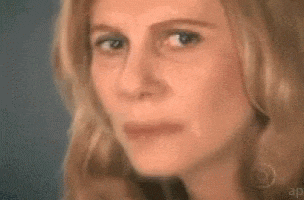
I think we don't need more to put 2 and 2 together : Ed is going to be a very important ally on our!Ciel's side against real!Ciel's.
#kuroshitsuji#edward midford#ciel phantomhive#cedric k. ros#undertaker#2CT#weston arc#blue revenge arc#kuroshitsuji theory#editor k#yana toboso#kuro 2024#my analysis
137 notes
·
View notes
Text
shilling for servamp again but one of the great things about it is the depiction of seven deadly sins. sure, the characters who represent the sins turn out to be the victims of said sins have been done thousands of times before BUT
the vampire of sloth died because he was falsely accused of a crime he didnt do. what's the crime? well, it's implied to be rape, but that sounds more lust than sloth, isn't it? wrong. the sloth in this scenario, or rather accurately, acedia, is the fact that the villagers knew who the real culprit was, but decided to keep quiet because they owed the culprit's parents and let the yet to be vampire of sloth volunteered to take the blame without knowing what the crime was truly about
he died because of other people's negligence to take responsibility of their deeds, and that makes him a victim of sloth
the vampire of gluttony is depicted as someone who eats a lot but how did he die? starvation, perhaps? wrong. he was a slave that was made to fight in an arena meant to mimic the Colosseum of old and he was the spectators' favorite and even the owner admitted he was the winning horse that made the money rolled in.
he gave a portion of his food to a fellow slave, a young girl whose job was to clean the champion's cage, and ended up witnessing her getting beaten up for it in the middle of a fight, distracting him and making him lose his life.
so what's the gluttony in this situation? gluttony is the sin of hoarding wealth. he was their moneymaker, their champion, but the one who had the privilege to spend what he earned was his owner. and he died because he dared to share what little meal he had to someone else who needed it just as badly as he did
136 notes
·
View notes
Note
I understand if this is outside your field of expertise, but do you think if the ornamentation of the clothing that (some of) the kobolds drawn by Kui wear is inspired by anything?
Actually this is exactly my field of expertise! I studied costume design for about two years in university before switching to something else :) So clothing is something I love looking at and talking about, and fashion history is one of my favorite elements of history in general!
HOWEVER, though I have some experience with subject, I'm not a fully trained expert in the field, and I know that I may not have all the answers, so please take what I say with a grain of salt. This is only my educated guess.
I'm assuming that you're talking about this page from the Daydream Hour book:
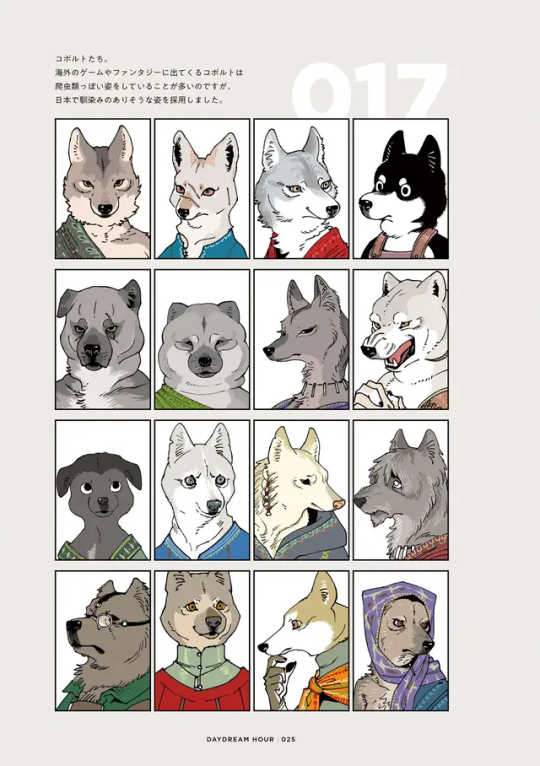
To start with, the caption says: "Kobolds that appear in foreign games and fantasy often have a reptilian appearance, but we chose an appearance that is more familiar in Japan." This doesn't tell us anything about their clothing, but I wanted to translate it to make sure it didn't say anything about their culture.
(You can read more about why the Dungeon Meshi kobolds are dogs in the Half-foot chapter of my Dungeon Meshi research project)
Kobolds likely live all over the world, but their large population centers are all located in the Western Continent, so that is probably the region they consider home.
So those two kobolds on the bottom left of the chart, who appear to be wearing European-inspired clothing, are probably living somewhere in the Eastern hemisphere, where Northern/Western/Central/Eastern European clothing is the norm, while the rest are likely from the West. So we can discard the European-looking clothes, since that's probably not a part of the kobold's traditional culture.
We have very limited information about the Western Continent, but these images plus what we know about Kabru (His name and Utaya's name are both South Asian, the dessert that comes from Utaya is South Asian) and the elves (several of them have South Asian names, some elves wear South Asian clothing and bindis) makes me think there's probably a strong Indian/South Asian influence in the Western Continent. It's a large land mass, so I don't think it's all South Asian, but South Asian culture is the only thing we have conclusive evidence of so far.
The majority of the kobolds are wearing brightly colored tunics with patterns on the hems, or what seems to be dresses/tunics made of draped fabric, also with hem decoration.
It IS worth noting that Kui avoids drawing elaborate patterns, even when it would make sense for her to do so. She does it only a couple of times in the manga and uses screentones instead whenever possible. So the simple hem decoration and single color fabric may just be an artistic choice that doesn't mean anything other than "I didn't want to draw a pattern." However, it's all we have to work with, so I'm going to assume it's intentional.
The repeated over-the-shoulder draped fabric the kobolds are wearing seems like it could only be a Greco-Roman style toga, palla, or cloak, or a South Asian saree. We have seen Western elves wearing garments similar to all of these on occasion, though obviously Kui has made some changes. As I say in my essay, I don't think any of the cultures in Dungeon Meshi is an exact copy of a real-world culture, Kui is remixing things together.
(Except for the Island of Wa, which seems to be entirely based on Sengoku-era Japan.)
Roman togas were just large pieces of cloth that they draped around their bodies, and they were usually white, with brown or black reserved for the lower-classes or for use during mourning, and purple or red reserved for extremely important people. Embroidery and trim, if they had it, was usually either very simple (plain colored stripes) or very elaborate (images of people, animals, or things).
So I think that rules out the toga as a possibility.
On the other hand, the saree and dupatta are also large pieces of cloth draped either around the body and over the shoulder (and sometimes the head), and usually they are either a single plain color, a plain color with a decorative trim, or an all-over pattern. This is a lot closer to what Kui draws the kobolds wearing.
(Pictures and more text after the cut)
Toga:


Saree:
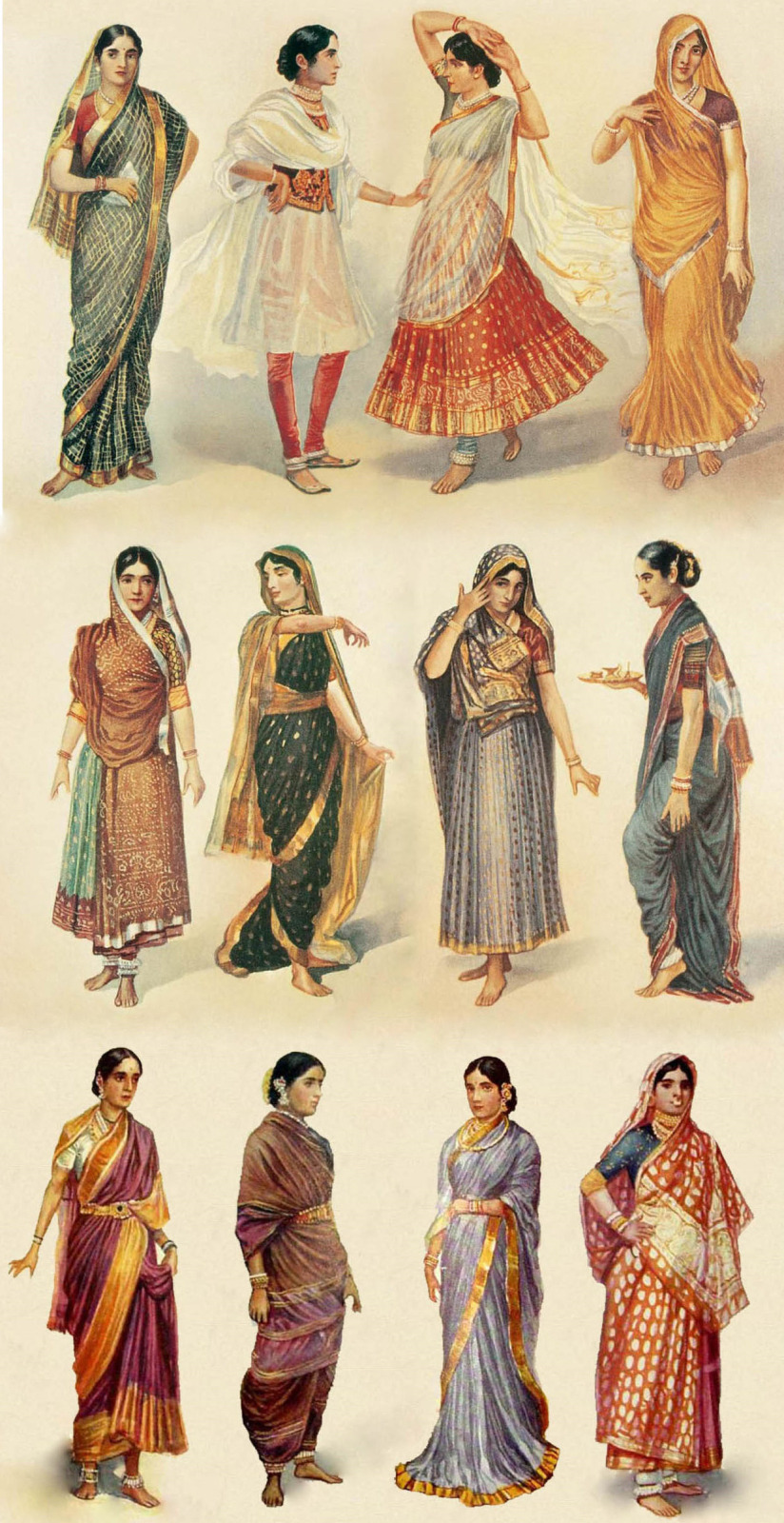

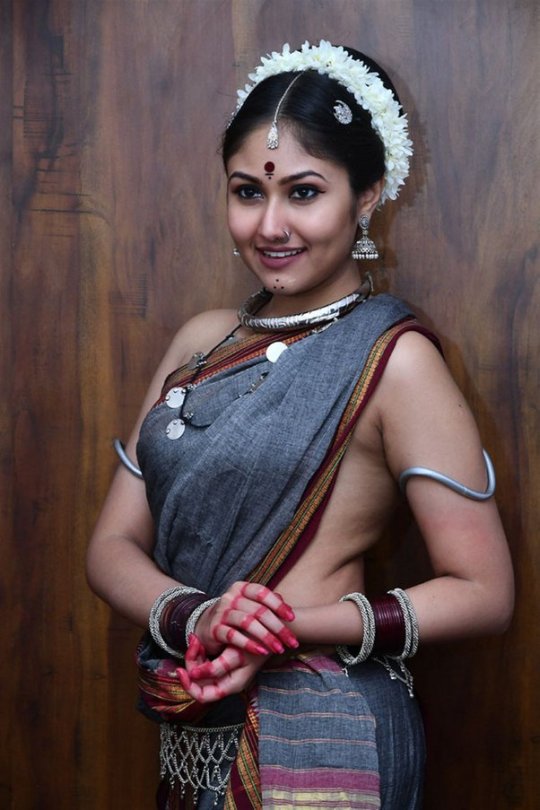



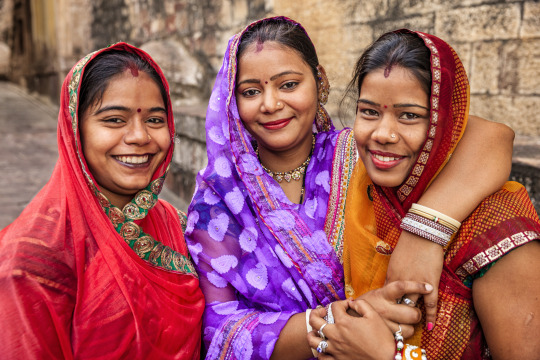


The tunics the kobolds are wearing could be many things, as what's visible is not an uncommon neck shape. They could be something like a kurta, kaftan, or abaya (tunic/robe)... And there's probably a dozen other similar garments that I'm neglecting to name.
There are a million variations on the kurta, but these neck styles looks like what Kui is drawing on a couple of those kobolds.



However, some of the tunics COULD also just be a depiction of what is often called a "Viking tunic" or kyrtill (Nordic name for a kirtle or tunic).

However in Dungeon Meshi, the kyrtill is extensively worn in the Eastern hemisphere, primarily by dwarves, tall-men and half-foots. So I don't think the Western hemisphere kobolds are wearing them, and the style of trim looks different to me than what Kui drew.
Kobold fashion could also be influenced by any culture from North Africa, West Asia, or the Middle East, as these are also cultures that appear to dominate the Western hemisphere of Dungeon Meshi, and that have similar fashion cultures involving patterned textiles and draping cloth/veils/head coverings...
However, because of what seems like a large draping cloth over the shoulder, and the combination of trim with a solid color, I think the primary influence is South Asian rather than these other cultures.
I hope that helps! And keep in mind that Kui loves to remix things, so I'm sure there's elements from other cultures that would fit right in with what she's shown us of the kobolds, if you want to get creative with your fan works!
#dungeon meshi#delicious in dungeon#dunmeshi#kuro dungeon meshi#kobolds#analysis#talking mushroom#The Essay
56 notes
·
View notes
Text
Sebastian and Bards relationship in the cannon is not talked about enough.
Not to sound pretentious, but I feel like it may be more accurate to say their dynamic in the context of the series.
The simplistic caveman side of my brain wants to say that they’re just two dudes, which isn’t wrong. But the analytical side of my brain wishes to elaborate 🤗.
Behold my tangent.
One of my favorite lines in this series is when Sebastian tells Bard quote “You fear death, as humans should. You must be the only one in this manor who does.”

(The fact that it pans to Ciel is just 👌👌👌. Good shit, love to see it.)
To me, Bards backstory segments where we saw him adjusting to life in the manor had a different feel to when we saw the same for Mayrin. We got to see her interact with oCiel, Finny, Nina, and even Lau briefly. But with Bard, he was only ever really shown with Sebastian. Or at least mainly.
There’s a stronger sense that Bard doesn’t quite fit in with the rest of the household. Which I felt was emphasized by this panel.

I interpret this as him saying “what the hell am I doing in the house full of crazy kids.”
Which leads me back to my main point. Basically, Bard is the most normal human in this house. And who is he paired up with the most? Debatably the least normal “human” in the house.
Except I bet that’s not how Bard sees it. While Ciel may be the master of the house, Bard and Sebastian are the adults of the household. The men of the house if you will. (Yeah yeah Mayrin and Tanaka are adults too. But in Mayrin’s case b/c of her time as a snipper she hadn’t lived as much of a life as Bard, so she’s not quite at the same level of maturity. And I’m going to ignore Tanaka since he’s less of an active player among the servants.)
I’m trying so hard to break down my thought process rn :’) OK, because of this, I bet that Bard views Sebastian as sort of like his bro. They have this shared responsibility to take care of the ‘kids’ in the house. (Take a shot every time I say house).
Honestly idk where I’m going with this. Sebastian is like the strict mother who expects highly of the servants. While Bard is the bad influence uncle that endorses smoking, drinking, and pornography.
They have a weird partnership, one that boarders on a one sided friendship. They both have an unspoken understanding that they share the responsibility of adults looking after children. Only for Bard to then be put back in his place by Sebastian, as HE probably views Bard as just another one of the kids he has to manage.
I swear I had a point, I don’t think I conveyed it properly. Anyway, sorry for the long post. I honestly love Bard as a character, he’s very interesting when you really start to think about it. He doesn’t get enough recognition from the fan base esp when it comes to analytical perspectives.
#I may add more of my thoughts to this in the future#idk they just have a very unique dynamic#one that we don’t see a lot in kuro#Bards like ‘I’m a dude and your a dude let’s be parents’#only for Seb to be like ‘get back to work’#just a couple of dudes#I will say that I don’t rlly ship them since I find this version of their relationship more interesting#and I’m a Sebagni loyalest#ok I need to shut up now or else I could go on forever#black butler#kuroshitsuji#sebastian michaelis#black butler analysis#black butler bard#black butler baldroy#long post#my analysis#sebard
50 notes
·
View notes